#or with someone we deeply trust where we allow ourselves to be who we truly are without fear and even then that can be rare
Text
What kind of person are you going to cross path with this year?
A stranger I shall meet, a soul unseen before,
Their presence will ignite a spark within my core.
Our paths have crossed with fate's design, A chance encounter that we cannot define.
- The Poet
PICK a card 🀧
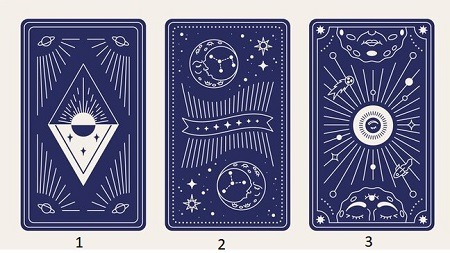
🟡 Card 1

⊹ Ah, the Hierophant! This card embodies tradition, structure, and the quest for guidance from established systems or institutions. It signifies a possible encounter with someone who exudes wisdom, authority, and a profound connection to spiritual or philosophical beliefs. You may come across an individual who possesses immense knowledge or holds a position of influence within their community. This person could be a spiritual mentor, a guide, or someone who deeply values and upholds tradition in their approach to life.
⊹ This encounter holds the potential for you to gain valuable insights, receive guidance, or even establish a mentor-mentee relationship. It may be an opportune time for you to explore your own beliefs and delve deeper into your spiritual or philosophical journey and personal evolution.
🟡 Card 2
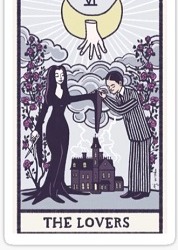
⊹ The Lovers card! What an intriguing revelation as we embark on this quest to discover the next person who will cross your path. This card is a symbol of partnership, harmonious connections, and the incredible potential for profound, genuine love. It signifies that an important encounter is on the horizon, one that holds the promise of a meaningful relationship or connection.
⊹ In the context of your inquiry, The Lovers card beckons you to embrace the possibilities of love and companionship. It suggests that a significant meeting with someone who deeply resonates with your soul is likely to occur soon. This person could be a potential romantic partner, a kindred spirit, or even a close friend who will inspire and uplift you.
⊹ Drawing The Lovers card also calls for introspection regarding your own beliefs, values, and desires in relationships. Are you truly prepared to welcome love and meaningful connections into your life? Consider this as an invitation to align yourself with your highest intentions and to remain receptive to the opportunities that come your way. By embracing the energy of The Lovers, you are setting the stage for a transformative encounter, where both individuals have the potential to grow and evolve together. Trust in the universal flow, for it brings people into our lives for a purpose, even if their significance is not immediately clear.
⊹ As you navigate this journey, remember to stay true to yourself and honor your own needs and boundaries. Allow this encounter to unfold naturally, and bear in mind that every connection we forge serves as a mirror, reflecting back the aspects of ourselves that are ready to be witnessed and embraced. May this meeting be a beautiful symphony of souls as you cross paths with someone who has the potential to enrich your life in extraordinary ways. Trust in the journey and remain open to the enchantment that the universe has in store for you.
Blessings on this path of connection and discovery.
🟡 Card 3

⊹ Behold the presence of the Temperance card! In the realm of Tarot, this card symbolizes balance, harmony, and moderation. It signifies the integration of opposites and finding a middle ground in all aspects of life. When this card appears, it suggests that the next person you encounter will embody these qualities of balance and moderation.
⊹ Prepare yourself, for the weaving of a captivating narrative that brings these insights together. The Temperance card reminds us of the significance of balance and harmony in our connections and interactions. It indicates that the individual you are about to cross paths with will bring a sense of serenity and equilibrium into your life. They will act as a bridge, harmonizing different aspects of your existence and helping you find a perfect blend between your creative pursuits and other areas of your life.
⊹ Their presence will inspire you to embrace a balanced approach to self-expression, allowing your creativity to flow freely while staying grounded in practicality. Together, you and this person have the potential to transform each other's lives. You will support one another in finding balance and harmony within yourselves, navigating the highs and lows of life, and remaining aligned with your true essence.
⊹ This person will offer valuable insights, shedding light on new paths and possibilities for your personal growth and self-discovery. As you cross paths with them, be open to the lessons they bring and the opportunities for growth that arise. Embrace the qualities of balance, moderation, and harmony represented by the Temperance card, and trust that this connection will guide you towards a more fulfilling and harmonious path.
Remember, this is a General Guidance and Insights.
For Paid Personalized Analysis & Reviews ➤ Check Here
Masterlist ➤ Check Here
#pick a card reading#pick a card#pick one#pick a pile#tarot reading#tarot cards#tarotdaily#tarotblr#tarot
100 notes
·
View notes
Text
Truly Baffled every time I see people actually interpreting Doffy as someone who cares deeply for his family
Like if we're writing fanfic that's all fine and good, we're allowed to have fun and indulge ourselves, but I always find people in comments sections talking about how canon Doffy cares for the Doflamingo family deeply or somehow reaching for the conclusion that he deeply trusted or valued Rosinante and started mentally slipping after killing him, interpreting that one scene in the big Dressrossa fight where he flashes back to Cora and screams as evidence of this, and I have to wonder, did we witness the same character or did I somehow pirate the wrong version of One Piece? You mean to tell me that Donquixote Doflamingo, Mr "Threaten every subordinate with death if they fail, and disparage them to their faces for fucking up when they're injured defending me", Mr "Order Monet to commit suicide and take out my enemies with her", Mr "My little brother will eat the Ope Ope no Mi and die for my immortality" has any concern for his minions beyond how they function as extensions of himself, and how well they're suited his needs? Of course he doesn't feel the need to punish his executives horrifically for every minor transgression or unfortunate turn of events because he's smart enough to tell there's no need to get rid of anyone who's still useful and still extremely vulnerable to his manipulation but like
This is a man who immediately defaults to disparaging those very same people when they fail in their objectives, and who clearly has no qualms about giving them up entirely if the cost of losing them is outweighed by any potential threat to his operations. Anything that could be possibly, remotely interpreted as him displaying his own brand of care or defending them (i.e. sanctioning murder whenever someone mocks Pica's voice, murdering Baby 5's manipulative partners, specifically studying Flevance to better manipulate understand Law and trying to convince him their traumas are similar and he gets it too, so he'll enable his violent thoughts and help him pursue destruction) is a very nakedly obvious abuser tactic designed either to maximize his hold over them or to treat any slight against them as a slight on his authority. If Oda wanted to make him a character who cares for people in a fucked up way, it would have been very very easy to give him any moment of internal monologue that implies that much, but he's only demonstrated anything resembling care for one person in all his flashbacks and absolutely nothing other than deep-seated contempt whenever we get a flash of who he really is beyond the facade he puts on. I've got a whole thesis on why he likely behaved in ways that were deeply upsetting or harmful to Cora (if not outright abusing him) even before all the shit went down in their childhoods and he killed Homing, but suffice to say that Doffy is a good villain specifically *because* he puppeteers his followers via implicit and explicit control and manipulation tactics, and has no regard whatsoever for anyone other than himself and he doesn't actually need to have any redeeming qualities to be a complex and well-written character.
#donquixote doflamingo#donquixote rosinante#donquixote family#doffy#one piece#dressrossa#dressrossa saga#trafalgar law#monet one piece#pica#trebol#corazon one piece#baby 5
112 notes
·
View notes
Text
I'm very conflicted.
We were recently diagnosed with DID, but this was not a new discovery for us. We have been operating under the partial assumption that we have the disorder for exactly a decade this year.
I say partial because it genuinely never stuck. The nature of our trauma and resulting anxiety prevented us from seeking any sort of mental health treatment, in any capacity, which as you can imagine, precludes any hope of diagnosis. So, from the age of 14 onward, we existed in this strange in-between state, where we gained and lost insight at different times. We lack self confidence, and though we supported the right of others to self diagnose, we (particularly Moira and myself) believed it would be silly to think any of our research could possibly be adequate. DID is a heavy diagnosis, and it's very hard to feel justified in claiming the label.
We tried many different methods to be okay with existing as more than one; and this is why the existence of endogenic systems was NECESSARY for our mental health. As someone who absolutely could not get diagnosed due to abject fear, and whose low self esteem and lack of expertise prevented them from trusting their own judgment, the idea that there are people who just allow themselves to exist without needing professional validation seemed like the only way forward for us.
Ultimately, I still think it is. I would not be this far along in my personal journey without the existence of the wider plural community, and though the rest of our system does not share my personal anti-psychiatry sentiments, it has been extremely important for them as well.
But it hasn't worked yet, and this feels a little bit like a failure on our part.
We finally hit a breaking point fairly recently, and found a therapist who then quite promptly diagnosed us. Since then, it's been night and day. Alters are more active, we switch more frequently, we are capable of leaving the house on short notice (and at all!). Our social anxiety has largely vanished, at least for the time being. It's like waking up after ten straight years of a depressive haze dominated by our repressive persecutor-host, and she is finally getting the rest she needed.
But really, after all that? The journey to self discovery, the repeated attempts to convince ourselves that we CAN just choose to be this way, that we can just act the way we naturally wish that we could... the only thing that could break through the wall was still to validate it through the framework we were trying to escape.
We tried so, so hard to truly believe that it would be okay for us to just be, but it just... didn't work. We still needed a therapist to tell us it was okay, that we really are the way we think we are, and that it is healthy to embrace. And it didn't matter how many peers also told us this; we needed a professional. We just did not believe anyone else, even though we desperately wanted to AND deeply respected their journeys and experiences.
This isn't really meant to be a Sad Post or anything, I mostly just think we have a lot more work to do. We were deeply damaged by things like fakedisordercringe AND many anti-endogenic sentiments in online system communities, and it is not nearly as easy to shake the self hatred and doubt as I'd hoped.
I do, to some extent, resent the fact that we ultimately felt that we needed someone to give us permission to exist. But. Well. We do certainly feel like we are allowed to exist, now. Perhaps even a bit vindicated.
Strange.
#did system#syscourse#<- mainly for blocking purposes! This is NOT a syscourse post but I briefly mention it#🪐 post#also clarifying that I do not mind this ending up in the syscourse tags. I didn't forget
11 notes
·
View notes
Text
The Fulfilling Journey of Being a Reiki Practitioner
Shaina Tranquilino
February 5, 2024

People are constantly seeking ways to improve their physical and mental well-being. One holistic practice that has gained significant popularity in recent years is reiki. As a reiki practitioner myself, I can confidently say that this path brings immense fulfillment, not just for those we help but also for our own personal growth. In this blog post, let's explore why being a reiki practitioner is so deeply fulfilling.
1. Empowering Others:
As a reiki practitioner, one of the most rewarding aspects is the ability to empower others on their healing journey. Through gentle touch or distance healing, we channel universal life force energy to balance and harmonize the recipient's energetic system. Witnessing clients experience deep relaxation, stress relief, pain reduction, emotional release, and overall well-being is incredibly fulfilling. Knowing that you've played a part in someone's healing process creates an indescribable sense of joy and purpose.
2. Creating Positive Energy Exchanges:
Reiki sessions create powerful energy exchanges between the practitioner and client. During a treatment, both parties immerse themselves in a serene atmosphere where positive intentions permeate the space. This exchange enables profound connections with individuals seeking healing and promotes an environment conducive to fostering trust and compassion. The shared experiences during treatments often result in lasting relationships built on genuine care and understanding.
3. Personal Growth and Self-Healing:
While offering healing to others, reiki practitioners embark on an inner journey of self-discovery and growth. Regularly practicing reiki allows us to become more attuned to our own energy systems, bringing about personal transformation and healing. By working on ourselves, we enhance our abilities as practitioners – becoming clearer channels for divine energy to flow through us effortlessly.
4. Cultivating Mindfulness:
Reiki inherently encourages mindfulness in both practitioners and recipients alike. The practice requires us to be fully present, focusing on the energy flowing through our hands and into the recipient's body. This heightened state of awareness fosters a deep connection with the present moment, enabling practitioners to let go of distractions and worries. The mindfulness cultivated through reiki spills over into all areas of life, leading to increased clarity, peace of mind, and overall well-being.
5. Being Part of a Supportive Community:
The reiki community is a tight-knit group that shares a common passion for healing and spiritual growth. Engaging with fellow practitioners allows for valuable exchanges of knowledge, experiences, and techniques. Participating in workshops, seminars, or reiki circles not only expands our understanding but also provides ongoing support from like-minded individuals who understand the unique journey we are on.
Being a reiki practitioner is truly fulfilling in countless ways. From witnessing the transformative effects it has on others' lives to experiencing personal growth and cultivating mindfulness within ourselves – each aspect contributes to an enriched existence. By embracing this holistic practice, we become catalysts for positive change while simultaneously nurturing our own well-being. If you feel drawn to healing work and have an innate desire to make a difference in people's lives, consider embarking on the fulfilling journey of becoming a reiki practitioner.
#reiki#energy healing#reiki journey#distant Reiki healing#Holistic living#Mind body spirit#Reiki practitioner#Healing energy#Healing hands#Spiritual wellness#inner balance#self discovery#reiki life#holistic health#Wellness journey#Energy flow#Positive vibes#Self-care#Empowerment#Spiritual awakening#Reiki community#balanced living#Inner peace#intuitive healing#Wellness#Holistic healing#Energy alignment#self healing#Mindful living#Life purpose
5 notes
·
View notes
Text
empress of the first water // Zhongli x Reader (2)

Word Count: 1.8k
Palace/Harem Imperial Drama AU: You are a princess, soon-to-be-Empress, and Zhongli is the teacher invited by the royal court to show you the ropes before you ascend to the throne after a royal tragedy.
Notes: female + Princess!Reader, Teacher!Zhongli, mutual pining, fake politics, Zhongli POV
xiansheng - Chinese honorific translated to as “person born before another,” also used as a title to refer to persons of authority or skills; generally used to mean “teacher”
[Previous] [Next]
Zhongli’s duties as the Princess’ tutor, as spoken by the head noble-- a man who seemed to always have a sneer on his face-- was to fully and completely reeducate the Princess. He understands now why his room is so close to yours considering how they have asked him to spend the majority of your day with him-- and vice versa. You seem to take this schedule in stride, listening to his lectures with an apt mind and following whatever lessons he brings throughout the day, regardless of familiarity or novelty.
But you are quiet, and as appreciative as Zhongli is at a rapt audience, he knows you have more to say than what you are giving-- but he understands. Zhongli can’t imagine not having a moment of solidarity when the presence of others can be so oppressive in the face of grief. In the middle of his afternoon lessons, he excuses himself and allows you to have a break. He knows he has decided well when you shoot him a grateful smile and when he sees you deflate the moment he closes the sliding door.
“Has she not been raised as a Princess for her whole life?” He asks the noble politely as they walk down the long outdoor hallways of the palace. He had been called to meet up with him on his way to court with the intentions to review the Princess’s progress, only it seems as though the head noble had no intentions of listening. “Surely, there is no need for me to go so extensively into that sector of education," he presses.
The noble sighs. “Mr. Zhongli, with all due respect, the girl--” Zhongli can feel his brows raise at the lack of title used-- “...has never been properly prepared for the possibility to become the Empress. She was one of the last ones in line to inherit the throne, so no one thought she could amount to anything. Surely, you’ve seen the way she acts?” The noble lifts his round silk fan to his face, and Zhongli, despite all his efforts to not feel disdain for the callous noble, feels his patience wear thin. “It was such a surprise, you see, to all of us when that tragedy hit, but alas, she’s the only one left.”
“I see,” Zhongli replies coolly. “And so you would have me follow her and scrutinize her every action to make her fit to rule?”
If the noble took heed of his frosty tone, he does not react to it. Instead, he looks at Zhongli coyly from behind his fan. “I assure you, it will be best for both you and me to have her reeducated. To an extent.” The noble says, “I assume you know what I’m referring to? You’re an intelligent man, Mr. Zhongli. You come from a good family and know much of the world… but you could always, ah, possess more.”
“Knowledge is power, as I am sure you are aware,” he says, chuckling. Zhongli watches in silence as the noble walks away, waving a flippant hand. “Be sure to take care not to provide her with too much, Mr. Zhongli, and perhaps I’ll refer you to a different title someday.”
.
.
.
When Guizhong was chosen to become a lady of another country, Zhongli felt, for the first time in many, that perhaps there was more to life than a constant grapple for power and the legacy that it would lead. She had not wanted to leave as much as he did not want her to go, but he did not understand then that he held power in his mind and in his own actions to change the path in which his path would lead.
Despite his disdain for the lies and trickery involved with the power struggle, Zhongli knows he will keep his promise to his father to uphold his family honor. He has always been a man of his words, for he bound himself into fulfilling them as though they are contracts.
But as he watches the head noble disappear behind the court doors, Zhongli wonders if that is all he is capable of.
When he thinks of Guizhong-- when he thinks of you, who has lost so much and could lose so much more, he thinks that for how your world seems to be against you, he wants to be someone on your side of the ring-- despite how everyone pressures for the opposite. Zhongli does not know if he deserves it, but he wishes to have your trust. He has yet to know how to truly support you, but he wants to provide you the freedom of choice if he can-- even in the smallest of ways.
And so he gives you freedom in the only way he knows how.
“What would you like to learn about today?” Zhongli asks you the next day as the two of you walk quietly to the study room. He can’t help the smile on his face when you turn to him in poorly-hidden surprise. Despite how you may act in front of the nobles whom he knows has an ill-opinion of you as you of them, you cannot help the emotions that come to the surface. He thinks himself lucky, if he were honest, to know that he is at least in your favor enough for you to let down your guard to give him a glimpse of the Princess he had seen not a fortnight ago.
To this date, he has only seen you be as such with your lady-in-waiting, Amber, but he knows that in his presence, he has only barely scratched the surface to the depth of your relationship and personality.
“What would I like to learn about?” You repeat, looking out into the garden in thought. “I’m not sure,” you say, turning to him. “What do you want to teach me?”
Zhongli blinks. “Pardon?”
At his confusion, you laugh, and Zhongli cannot help how his chest flutters at your sound of joy, for how far off it seemed that you would ever express that again. Just when he thought he could not be surprised, you tilt your head and smile teasingly at him. “You and I both know that the nobles are the ones that have been controlling my schedule for the past week. I want to know what you would want to teach me personally.”
Zhongli feels his cheeks warm at the tone of your voice. “Princess, I--” His father would be horrified at his lack of composure, but Zhongli cannot afford to think of his family and their expectations when you look up at him expectantly without an ounce of impatience. He clears his throat and thinks deeply, much to your amusement, putting his hand to his chin. “I suppose… I suppose I could provide you the history of the glaze lilies that the garden has in abundance?” He says, watching as your eyes soften, “They’re quite remarkable-- able to bloom in a night and gone in the next, some even saying they possess a different scent if you sing to them.”
“I agree with them, whoever said singing to them creates a different scent,” you say, looking out into the garden by the bamboo where three glaze lilies lay unbloomed. “If you sing the Liyuen lullaby to them, it produces a very soft fragrance-- almost like baby powder.” You turn to him and smile. “They were my mother’s favorite,” you explain gently. “She always sang and picked one for me to keep in my room.”
Zhongli lowers his head in respect. “My apologies, Princess, I didn't mean to bring up such personal topics."
“No, no! Don’t worry about it,” you tell him, laughing. “It’s fine. It’s nice to think of something nice like that.” You brush your hair behind your ears, and if there was a nostalgic lilt to your voice, he does not throw attention to it. “I like it,” you say, “please continue. I’m curious about the glaze lily’s history.”
And what was Zhongli to do for the Princess if not to continue?
Zhongli doesn’t know if you have committed his every word to memory, or whether you remember anything in regards to the dates he provided (you are terrible with dates, he has found out, much to your embarrassment; but much like everything he knows of you, he finds it endearing). But he watches as you walk through the garden with him, the most at peace he has ever seen you, and he continues to speak.
And Zhongli lets his voice rid of the garden of silence, your thoughtful hums and soft laughter as accompaniment. Soon enough, though, the sun sets and the stars begin to shine, and Zhongli leads you to your room where you will be served dinner.
You thank him for the lesson, and he nods gracefully, his hand upon his chest. When he raises his head, you are still smiling at him. (He thinks abruptly that he would like to keep that smile on your face, if only for a moment, and the next words tumble from his mouth.)
“If you are looking for a place by the sea,” he says, remembering your words from before, “‘where the wind blows and the earth is clean,’ then I believe that I shall make our lesson on that the next time we find ourselves free.”
You blink up at him, eyes wide-- lips parted as though awestruck until they widen into the kindest smile he has ever seen on you.
“Yes,” you say softly, “that sounds lovely. Thank you.”
Zhongli lowers his head again in respect, swallowing at the magnitude of your magnanimity. “Of course, Princess.”
He expects to be dismissed, but instead he hears you ask, “Would you like to join me for dinner, xiansheng?”
Zhongli wonders how many times a person can bewilder him one day. “Pardon me?”
“I’m asking if you, Zhongli xiansheng,” you say with a now-familiar lilt of amusement, “would like to eat with the Princess.” You laugh when he stands, tall as he is, gaping at you. “You can say no. I won’t take offense. Promise.”
And he thinks to himself that as generous as you are to offer him the option to deny your request, he doesn’t know if he ever would have.
Dinner consisted of the finest foods: Peking duck, the freshest peaches of Fontaine, the grains of Qingce Village, and bamboo soup that would have put his personal chef to shame. It is custom of the Princess to sit from a table distant from him, but in the confines of your inner chambers, you sit right in front of him, placing dishes in front of him for him to try. (Zhongli has a feeling you would pile food onto his bowl if you could.)
He has the delight of not only enjoying the foods you have offered but also the sight of your smiling countenance for the remainder of that night. And for once, he feels as though he has taken the reins on his own life-- for the better.
(He only hopes he can keep holding on.)
#zhongli x reader#genshin impact x reader#genshin imagines#zhongli#genshin impact zhongli#genshin zhongli#genshin x reader#sorry for the repost! tags r not workin w me#imperial drama au
233 notes
·
View notes
Note
Here's something I'd love your take on: I read a meta recently (would link it but I can't remember where, ack) that suggested that Sam is able to forgive John in later seasons because a) he's had the whole "family making unilateral decisions for your own good" thing repeatedly shoved down his throat, and b) whatever John did under this umbrella in their childhoods, Dean has done far worse by that point, and Sam HAS to forgive him so by extension he can't really be mad at John anymore (1/2)
(2/2) As someone who has admittedly only seen bits and pieces of the later seasons, this seems to jive with Sam losing a lot of his characteristic early-seasons anger, letting Dean call the shots almost all the time even when he thinks it's the wrong move, and moments of sympathy for John (contrasted w/Dean's growing resentment, which is so interesting!). But! I got some big ol' gaps in my spn comprehension, so was curious if you had any thoughts on this dynamic
wow okay long answer warning! i got carried away and forgot how to use punctuation. nobody is obligated to read all of this lol and the biggest part of the answer is behind a cut. anyway!!
first things first: i think a big thing to remember with sam’s characterization in later seasons is that it’s like...not there, and when it is there, it’s sometimes flat and inconsistent. because dean became sole the main protagonist after the first 8 (arguably the first 5 or even first 2) seasons, sam sort of got demoted to “side character we don’t know what to do with” along with cas and crowley. they all had good arcs pop up now and then (sam had some fun stuff going on with lucifer in s11 and s13) but most of the time the writers either don’t know how to give him a meaningful characterization or don’t care (or both). so we have to do a lot of that work ourselves.
so, for example, when we talk about sam losing his anger, i like to read it as him OVERCOMING that anger to avoid becoming his father (which may even be where some of the seemingly sympathetic comments come from, because he’s trying to be forgiving instead of angry), but really...it’s that the writers forgot he had anger issues. in-universe explanation vs irl explanation, yk? and i think pretty much all meta about sam in late seasons is written through that lens, whether the writer of that meta knows it or not. including this one! i can’t prove any of this shit, it’s my personal reading, i’m making it up. like there were just SO many different people involved in the production of supernatural that there was a lot of conflict and contradictions in things like continuity and characterization. (most of the writers room hadn’t even seen every episode!) so there’s not one definitive way to go about it. in many ways it makes the characters more nuanced and in many other ways it makes me fucking insane.
as for sam and john and whether or not sam forgives him, i’m actually glad you asked because this has been driving me nuts for a long time and it took me SO LONG to pin it down - sam’s relationship with john is very different to dean’s, and i couldn’t figure out WHY. it’s not that he was “abused less,” it’s not that he loved john less or was less hurt by his actions, so why doesn’t he seem as INVESTED in everything that happened to them as kids? like he says in season 14 he had to learn to let it go and that it was all a lifetime ago for him. meanwhile i think dean still deals with it every day. he’s still stewing in it to some degree 24/7. so like what’s the difference??
i think it comes down to two things. firstly, that while dean didn’t have anybody parenting him except john (and mary, but only for a very short time that he could actually remember), SAM’S parents were john AND DEAN. most of the time dean was the one raising sam, and in fact he arguably did way more parenting of sam than john did. so the person that made dean feel safe and like he could fight back against monsters, the person he was grateful to, was john. but the person who made SAM feel safest was dean. he doesn’t have that same gratitude towards john that dean does and he never will, because of how john made him feel alienated and excluded from their family growing up. dean’s resentment of john is so tangled up in this very deep and unconditional love and gratitude for him that sam just doesn’t have.
secondly, i think dean has a serious case of “i can fix him” re: john that sam doesn’t have and possibly never had. john just never showed sam the same kind of inclusion and warmth and trust that he showed dean (however rarely he showed it, and however fucked up it was). i think sam figured out very very early on that their quest for yellow eyes was either a long shot or straight up impossible, and that they couldn’t waste their entire lives doing it, and that even if the demon died, john was never going to change. dean 100% drank the koolaid - he really truly believed in a world where someday they’d kill the demon and all retire from the life and be normal and be a family again, because that’s what john said and dean took his father’s word as gospel. sam knew better.
so i think what sam did was just disengage. partially because he felt he couldn’t afford to nurse that kind of anger and not become either his father or lucifer, and partially because even though sam loved john, still loves john, he never needed him the way dean did, because sam had dean. so it doesn’t hurt him as much to just “gray rock” it. i think if sam stopped and really dug into it he’d find that he’s still quite angry (probably more angry on dean’s behalf than his own, at least at first, because in his mind he was able to move past it and dean was not, dean had it worse, HIS OWN trauma isn’t real etc etc), but he doesn’t do that because he doesn’t want to be that angry, and possibly even thinks that if he brought it up dean would jump to john’s defense and it would cause a fight, which the opposite of what a gray rock does.
as for being forced to forgive john because if he didn’t he would also have to condemn dean...i don’t think i buy that at all. sam is fine making dean his exception and he allows dean to get away with a lot of deeply horrible shit he would condemn other people for. partially because he’s dean and sam loves him, but in my ~personal reading~ of sam, this is also because once sam became an adult the weight of everything dean did and had to give up to raise him really sank in, and part of him felt guilty (even though sam arguably didn’t have a childhood either). you know how kids take care of their parents in old age to repay them for raising them? that’s sort of how sam is with dean in later seasons - he implies multiple times that he would leave the hunting life forever and not look back if it weren’t for dean.
and as a side note - sorry, this is only tangentially related - dean implies several times in later seasons that the job is where he finds his sense of accomplishment and self-esteem and meaning - he believes the world is a better place because of what he and sam do, and even though he doesn’t always like DOING the job, he likes the outcome. it’s weird because this is as close as we see dean get to even HAVING self esteem. sam, emotionally intelligent, would have picked up on that - and since he and dean have both tried to leave the life multiple times and have always come to regret it, i also think part of sam believes you CAN’T escape - certainly SAM could never escape so long as dean was still in it, because whether he meant to or not dean would always pull him back in. and part of dean doesn’t really want to escape because he’s made his peace with it. so sam stays, and i think even if he can’t find the same meaning in the job that dean does, he finds a lot of meaning in being there for dean. (this, like gray rocking, is also consistent with the seasons where sam’s sole character trait is caring about dean lol. but i’m happy enough to read it in a kinder and less bitter/resentful way.)
it IS worth noting i think that the most forgiving sam ever was about john was in the adam episode, where he said he understood why he was the way he was and why he did what he did, and when dean said they were alike sam decided to take it as a compliment. sam in season 4 is arguably at one of his lowest points - struggling with addiction, consumed by anger and hatred and the need for revenge. he WAS like john in many ways, and i think he justified what john was doing because it also justified what HE was doing. but what he was doing led to breaking lucifer out of hell and the apocalypse that followed, which is why i like to think sam worked so hard to reign in his anger afterward - both to avoid his fate and avoid becoming his father.
in short: i don’t think sam has actually forgiven john so much as disengaged from him and moved past it. because if he DID engage with it, it’d bring up a whole lot of stuff he didn’t feel prepared to deal with. one of the risks of gray rocking things is doing it to the point that you lose touch with your own wants and needs and personality, so i think by late seasons sam’s repression, which is much more sneaky and quiet than dean’s, has settled in to the point where he’s like “yeah whatever” about dad out of sheer self preservation - because otherwise, he’d end up going crazy about it like dean does. i think it’d do him a hell of a lot of good to be able to get to shout at john and finally say his piece/ he’s really afraid of his own anger, but i think it’d be healthy for him to get back in touch with some of it.
[spn masterpost]
#liz answers asks#bimbonaparte#sam winchester#john winchester#liz makes stuff#liz's spn stuff#liz's meta#whew this was a long one sorry.#i am so glad you have the same icon on tumblr and ao3 i was replying TO YOUR COMMENT when i got this ask <3#fun cool coincidences!!!!!#anyway i didn't want to mention my fic but like this is why i had him yell in my fic. it's good for him#for himself and for dean he deserves to feel angry
38 notes
·
View notes
Note
For the random scenes - ask me to stay?
(Random Scenes Ask Meme)
This is one of the backstory scenes I wrote early on for the This Be The Verse universe (although it doesn't really need that context - it's basically an AU take on the final Garak/Bashir scene in the finale). It's one I've just never been that satisfied with. I did end up cannibalizing parts of it for one the Interludes in Tell Me You See Me (with a change in POV), and I may end up using other parts of it in something else (so it will probably end up thoroughly dismembered by the time I'm through). But here is the original version.
***
Julian remembered his last conversation with Palis, and the guilty little bubble of relief swelling in the back of his mind when he’d ended things. He’d always known that he couldn’t stay on Earth sitting behind an oversized desk anticipating the medical needs of visiting dignitaries and treating the occasional bout of indigestion. But there was more to it than that. There were the lies between them, the fact that he wasn’t the man she thought he was, and his certainty that she would never have loved him at all had she known the truth. He never even gave her the option of coming with him. The thought of her accompanying him to some starship or starbase, following him from posting to posting while he calculated just how many accomplishments he could get away with, was too utterly incongruous to contemplate. And she, well—she didn’t suggest it either, did she? Maybe a part of her was just as relieved as he was to end it.
He searched his psyche for that same sense of relief now, and found something else churning just beneath the surface of that bone-deep, hollow despair: anger. Because of course, of course, Garak wouldn’t even contemplate the idea of asking Julian to come with him. When it came right down to it, he hadn’t asked Palis to come with him because he didn’t want her there. On some subconscious level he had known that their feelings for each other were shallow, and the hurt of leaving her could never be more than skin-deep. The relief covered it over like a bandage, and he’d hardly thought of her in those first months on DS9. Until this moment, he hadn’t thought of her in years.
If he thought that Garak’s reasons were the same as his had been seven years ago, then maybe he could just go back to DS9 and let the cycle of sadness and loss run its course, piecing his heart back together so he could present it to someone else, maybe someone less maddening and broken and morally questionable.
But he knew Garak too well to dismiss his feelings as shallow. Garak feared sentiment because he felt it so deeply that it was beyond his ability to control.
It wasn’t even some misguided appreciation for the importance of Julian’s career. He didn’t think that much of Starfleet, or of Julian’s ambitions.
No, he was going to give Julian up without even trying to discuss their options, because in his mind this was some sort of symbolic final sacrifice to the great alter of Cardassia, just like in some depressing Cardassian epic. What kind of dutiful Cardassian hero were you, after all, if you hadn’t sent the love of your life away to prove your devotion to the State? Julian wanted nothing more than to grab him and shake him and shout at him, remind him that his whole goddamn life of self-sacrifice had not saved Cardassia, and force him to admit that rejecting every opportunity of personal happiness wasn’t going to help rebuild her.
Julian had always known that he would never outrank Cardassia in Garak’s heart, but if he could accept that, then frankly, Cardassia was going to have to learn to share.
“You’re going to need doctors.”
Garak froze. After a moment he turned around, examining Julian with narrowed eyes. “Undoubtedly.”
“You’re going to need more doctors than the Cardassian Union has left. You’re going to need to accept aid.”
“True. I’m sure the Federation will be happy to step in. Out of pure altruism and magnanimity, of course.”
“I’m not saying there isn’t any strategy to it. We’ve done very well for ourselves turning enemies into allies. Just look at what happened with the Klingons, after Praxis.”
This show of cynicism had the desired effect. Garak took a few steps closer to him. “You’re right of course, Doctor. In the decades to come, our civilizations may yet be friends. But this situation differs from the Klingons’ unhappy catastrophe in several respects. Cardassia isn’t the only world to suffer devastation. The Federation has also suffered in this war, and they will have to allocate their resources accordingly. They will have to temper their generosity. After all, Betazed is also in need of doctors.”
“Any Federation doctor can work on Betazed. Or Ricktor Prime or Tyra or any other Federation planet. But there’s a limited number of us who have any experience treating Cardassians.”
“Doctor,” said Garak, and there was a warning note in his tone, and a hesitation. “Julian—”
“For god’s sake, Elim! Do you want me to come to Cardassia with you or not?”
“Please think about what you’re doing,” said Garak, in a soft voice, the hint of warning replaced by something else, something that made Julian’s heart ache. “I don’t know if you can truly understand loss on this magnitude. I know that it hasn’t occurred to you that you might add to it, but let me assure you, that is exactly what you are proposing.” He held up a hand to stop Julian’s protest. “Listen to me, my dear Doctor. Back when I used to consider you entirely off-limits, I used to imagine what it would be like to bring you to Cardassia - to tour the museums of Lakarian City, or the Institute of Art, with my arm linked in yours. Take you to a little restaurant in Lakat that I think would make you reconsider your opinion on sem'hal stew. Listen to you scoff at all the monuments to colonial excess in the Imperial Plaza. It was a very idle fantasy, you understand. Or so I told myself, at the time. It was far too intoxicating an idea to take seriously. Being welcomed back to my home with open arms, all my sins forgiven, and you at my side - your body and mind at my disposal. Your love, if I was feeling especially maudlin. Not just for me, but for my world. I would have liked nothing better than for you to see her the way I did. And now…” he sighed. “And now, Doctor, tell me what it is you’re offering, exactly? You will volunteer your considerable skills to help my people. I certainly don’t doubt your intentions - compassion is second nature to you. I know that asking you to turn your back on them is pure selfishness on my part. But I don’t know if I can cope with it. How long would we have? A few months? A year? How long before Starfleet realizes that it has better uses for your talents? And where would that leave me? I know that in the midst of this destruction I will be haunted by memories of the past, visions of things as they used to be, faces of the dead. Don’t ask me to see your face there as well.”
Julian digested all this in silence. “And what if I stayed? Is that what you want?”
“What I want is not, and never has been relevant.”
“I think you actually believe that.”
“I’ve told you before, my dear, that I believe all my lies. But I know better than to believe yours. You are not going to resign from Starfleet, leave all your friends behind, and give up the protections of the Federation so that you can come live in the ruins of an enemy planet. With me. Not even you are that impetuous.”
“I’m not being impetuous,” he said. He paused, trying to form his reverberating, tumultuous thoughts into something that Garak would understand, and accept. “I’m smarter than you, you know. And that’s not arrogance, it’s just a fact. I’m smarter than most people. My parents made sure of that. But you’ve been spinning me around in circles since the day we met. You make me question everything I know and re-examine everything I believe. I can’t just wave my ideals and principles around like a flag, I have to argue for them - they have to hold up to scrutiny. I like the way you provoke me, even if sometimes you push too far. But when I get you to concede a point, I spend the rest of the day glowing. And sometimes, more than anything, I wish that you would let me comfort you, because I think you need it more than you’ll ever admit. You might be the most frustrating person I’ve ever met, and you drive me completely crazy. But I think I would rather be driven crazy by you than stay sane with anyone else. And frankly, you are being selfish - I can do more good here than I can anywhere else, and I think I’m going to, whatever you say. Avoid me, if you can’t bring yourself to trust me - it’s a big planet. I know you think that I don’t know what I’m getting myself into. You’re probably right. When I came to DS9 I was naive enough and insensitive enough to see Bajor’s woes as my grand adventure. But I’m not that person anymore - at least, I hope I’m not. I know this is going to be nothing short of hell. And—” Julian swallowed, and reached out a hand to cup Garak’s cheek. “And how can I say that I love you, and leave you to face that alone?”
Garak exhaled slowly, as if he’d been holding his breath. He leaned into Julian’s hand and covered it with his own. Then he chuckled, almost to himself. “This may surprise you, but I don’t have any idea what to say.”
“That must be very disconcerting for you,” said Julian. “Say that you want me to stay with you. Say that you want me to help you rebuild Cardassia. Say that you love me.”
Garak wrapped an arm around his waist and kissed him. “I want you, in every conceivable way. Stay with me, and help me rebuild my home. I love you more than I have ever allowed myself to love anyone.” His smile shifted into something more mischievous as he leaned in again and lowered his voice, speaking directly into Julian’s ear. “And I would very happily ask you to take me hard against that console, but I’m afraid I wouldn’t be able to stay quiet enough to avoid detection.”
Julian laughed, a little helplessly, wondering at the humanoid capacity for inappropriate humor in the face of tragedy, to reach for love amidst unspeakable horrors, and to find hope when nothing else was left. For a moment, they clung to each other as if the world might fall apart when they let go. But it didn’t, and it wouldn’t, and there were still many things left to do before they could take another step.
17 notes
·
View notes
Text
Star Trek: The Characters
Storytelling, especially where it regards movies and television, is always evolving.
Whether it’s in deeper themes, better effects, different genres, or evolving archetypes, there is always something that is changing, except, perhaps, where the importance of characters are concerned.
Characters are an integral part of storytelling, particularly where it concerns television. When it comes to television, the setup is everything, and the characters are part of that setup, that ‘home base’ that the audience returns to at the start of every episode. The characters are the people that the audience gets to know, who star in each adventure. Characters are what holds the audience’s investment, the reason fanbases tolerate bad episodes and praise good ones. In the end, the main characters keep an audience’s attention, making each episode, even the bad ones, enjoyable.
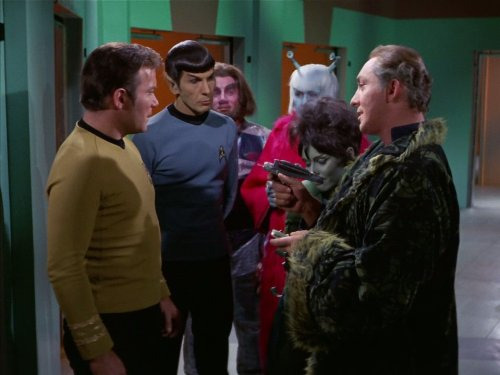
In short, characters can make or break a television show. It is vital that they be likable, or at the very least, interesting, lest the audience utter those eight deadly words:
I Don’t Care What Happens To These People.
Once those words are uttered, it doesn’t matter how gripping your narratives are. The viewers will start to leave.
See, while a film can get away with some lesser characters by distracting with an interesting concept, set-piece or a fast-paced story, television can’t. Thanks to a smaller runtime and a smaller budget, television, by necessity, tends to be character based. As a result, the main cast of a television show has to be able to work in multiple stories of different kinds.
This means that writing for characters on television can be pretty difficult.
The best television characters tend to merge two ideas together: That of relatability and entertainment value.
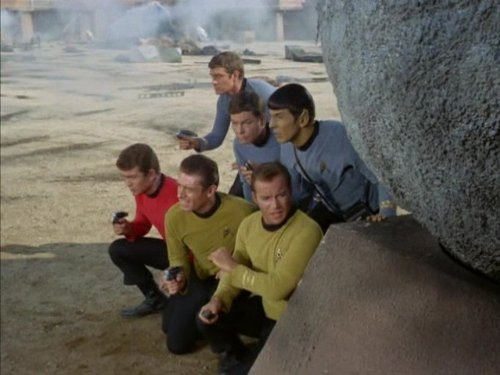
You see, television, like all stories, tells stories of exaggerated versions of reality, especially in the cases of science-fiction adventure shows like Star Trek. The only way to make an audience buy an unbelievable world is to create believable characters to place in that world, that relatability in the stories and characters. When we see McCoy’s frustration, or Kirk’s boldness, or Spock’s reservedness, we see elements of ourselves, our own personalities and lives. It is vital to make characters seem real, if not realistic.
The question is, does Star Trek manage to do that?
That’s the question we’re going to be answering today. Let’s take a look, starting with the Captain of the Enterprise Crew: James Tiberius Kirk.
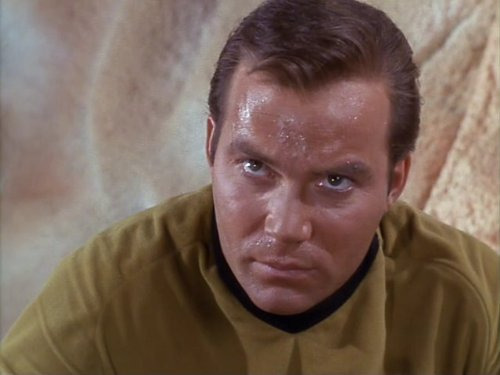
Kirk truly was The Captain in every sense of the word. A Reasonable Authority Figure who did far more adventuring than realistic counterparts would have, Kirk was an Action Man, level-headed, dutiful, and always loyal to his ship and his crew. A Bold Explorer (it’s in the job description), Kirk, while not fearless per say, took the Chains of Commanding quite seriously, and would often face down hugely powerful beings, power-mad computers, or other forces beyond him in order to save his crew. A Determinator to the last, known for his interesting ways to think outside the box and refusal to accept a ‘no win scenario’, he is the unquestionable Hero of the show, the Leader, who often throws the rules aside to do what he feels is right, in a constant battle To Be Lawful or Good. He was a Charmer, an expert fast-talker, and very smart. In later installations of the franchise, Kirk would become a Living Legend, much as he became in our own pop culture.
All that being said, the common cultural image of Captain Kirk isn’t quite right. Allow me to adjust it, as best I can.
More than any other character in Star Trek, or perhaps the history of television in general, Captain Kirk is possibly the most misrepresented character of all time. Since the ‘60s, Kirk has evolved into an icon of heroism, machismo, and brash boldness, with even the recent Star Trek reboot depicting, not Kirk, but rather, the distorted, separate idea of Kirk in the modern light.
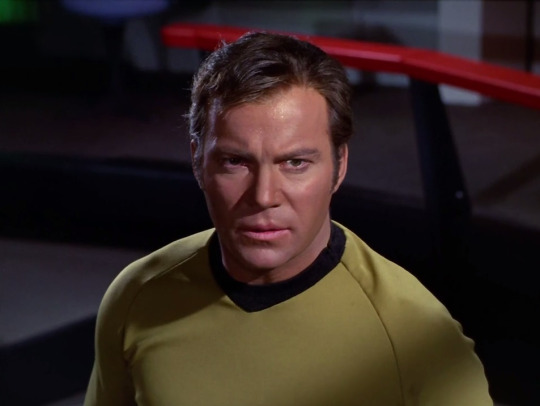
This idea, quite frankly, is just not right. While Kirk did have his share of romances, he was no womanizer, often entering into dubiously consented-to relationships reluctantly, in order to save the ship. The relationships he did actively pursue, he threw himself into wholeheartedly, and he was just as crushed as the other party every time they fell apart (for proof, watch City on the Edge of Forever or The Paradise Syndrome). Kirk was no player. As a matter of fact, he was a deeply compassionate man who respected the women in his life as much as he respected Spock and McCoy. It just so happened that the women in his life tended to not stick around, unlike his one true love: The Enterprise.
Even his reputation of the ‘Cowboy Captain’ isn’t accurate. As I mentioned before, Kirk was defined by compassion. His moments of ‘rule-breaking’ wasn’t to impose ‘the way he thinks things should be’, it’s because Kirk cannot bear to watch helpless people in trouble. The few times where he does break the famous ‘Prime Directive’ (To not interfere with less developed races) is to help. Kirk was a deeply moral character, determined to not stand by while people were taken advantage of. He wasn’t rash, either. While it may be accurate to say that the ship’s doctor, Leonard McCoy, was a bit on the hot-headed side, it is entirely inaccurate to accuse Kirk of the same. Kirk was an extremely smart man, a level-headed captain who was an expert at thinking fast. He trusted his instincts, but he trusted his advisors too, often finding a balance between McCoy’s impulsiveness and Spock’s cold rationality. Kirk’s intelligence and competence is often lost, overshadowed by his more extreme companions, and some audiences have forgotten the truth of Kirk’s character: a cunning problem-solver capable of saving the day under enormous pressure, whose decisions are far from based in irrationality. He is a romantic, duty-bound to protect his ship and crew, greatly exaggerated and mis-characterized in the years following his captaincy.
As such, Kirk was a well-rounded, balanced character, far more three-dimensional than the modern idea of him tends to give him credit for.
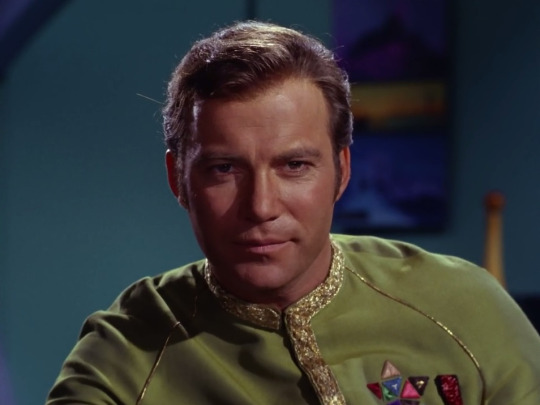
That’s all well and good, sure, but how does he fit as a main character in a television show?
As a matter of fact, absolutely incredibly.
Kirk serves as a wonderfully effective lead, compelling, entertaining, and interesting. Infinitely more developed than most leads of his time, and even more modern examples, Kirk was a game-changer, a revolutionary kind of protagonist who just worked. The perfect balance of the main trio of the series, Kirk is the perfect face for Roddenberry’s ideals: a hopeful pragmatist, an idealist who proves the best of humanity: compassion mixed with intelligence, boldness combined with understanding. A man of action surrounded by True Companions, Kirk was an extremely gripping protagonist who felt intensely, a perfect person for the audience to connect to and be invested in. He drove the stories, opposed the villains, and always saved the crew, as a hero should, but it’s important to note that Kirk was hugely human, possessing many of our greatest attributes, but some of our failings as well. He wasn’t perfect. Sometimes he made the wrong choice. In the end, though, he was us, or us as we should strive to be: always learning and helping, and always reaching for the stars.
But of course, Kirk wasn’t alone in his position as the ‘lead’ of the show. It’s doubtful the show would have survived in the popular culture as well as it did if it weren’t for his support team, his True Companions: Dr. Leonard McCoy, and, more famously: Mr. Spock.
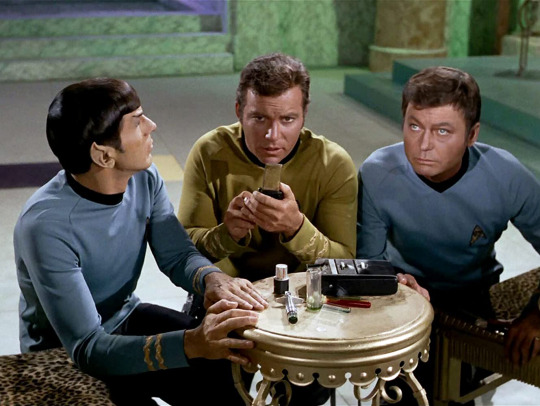
If Kirk represented the best of humanity, Spock represented the critique of it. In a previous article, I pointed out that Spock exists as a very unique character: a half alien, half human crewmember who, while equally valuable to the script and the characters as Kirk was, served a different purpose: to point out and explore humanity from the outside.
Like I’ve mentioned before, Spock is a different sort of character than Kirk is. Where Kirk is a demonstration of the best of humanity as we see it, Spock is a demonstration of humanity as someone else might. He served as a criticism of the human condition, a character at war with himself and his heritage, split between the emotional humans, and the rational Vulcans. Spock is the Number One, almost Comically Serious as he eschews his more illogical half and chooses to embrace the stoicism of the Vulcan people. A Gentleman and a Scholar, Spock has Hidden Depths, a heart of gold and deep emotions that he usually succeeds in hiding.
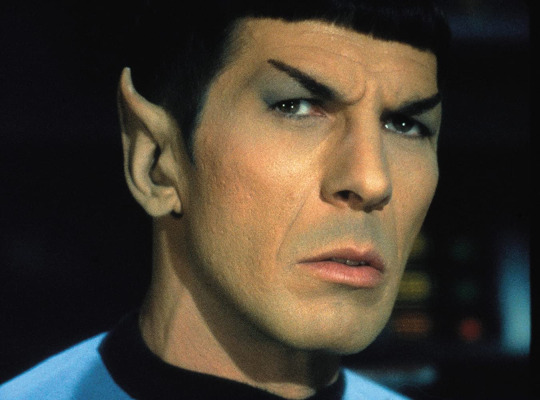
Most of the time. More on that in a minute.
Spock’s role in the show was The Smart Guy, the Stoic who had all the answers, all the statistics. He was the champion of impartial logic, of cold rationality. His job was to give Kirk the hard answers, to bring to him the facts and give him their options, especially the unforgiving ones. He is the cold to McCoy’s hot, a stern-faced, cold-blooded computer.
Or is he?
Much like Kirk, there is a lot more to Spock than meets the eye. While the cultural perception of Spock has often mutated into a parody of itself, much as it has done to Kirk’s reputation, Spock remains a much deeper character than he, or a brief skim of the series, lets on. As I said earlier, Spock is at war with himself, uncomfortable in his own skin. He insults humans for their humanity, but has strong, deep friendships with them. He is not above expressing frustration and their emotional natures when pushed (usually by other forces that knock his guard down), but isn’t frustration a human emotion?
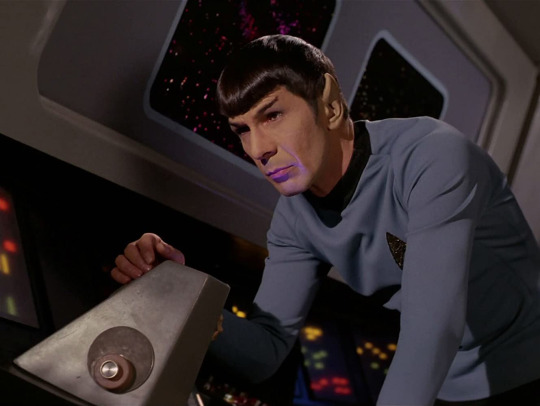
Spock is a bag of contradictions, a supposedly emotionless master of sarcasm, a man without feeling who invites his close friends (emotional humans) to a private Vulcan ceremony, a cold-blooded creature with undying loyalty who occasionally makes ‘illogical’ decisions that would make Kirk proud. A lover of music and a sympathizer to space hippies (Not one of Star Trek’s better episodes, admittedly), Spock was an outsider who fit neither fully as a Vulcan or Human, a person who was struggling to find his place in the universe.
At first, this seems incongruous with the ice-cold exterior he projects, however, rather than being an example of inconsistent writing, it’s a shining example of development and nuance.
You see, Spock never gives up his following of logic. He just begins to approach it differently.
Spock’s style changes slightly as Star Trek progresses (most notably in the films, released ten years after the show’s final season), from cold, ‘computer’ logic to something else: human logic.
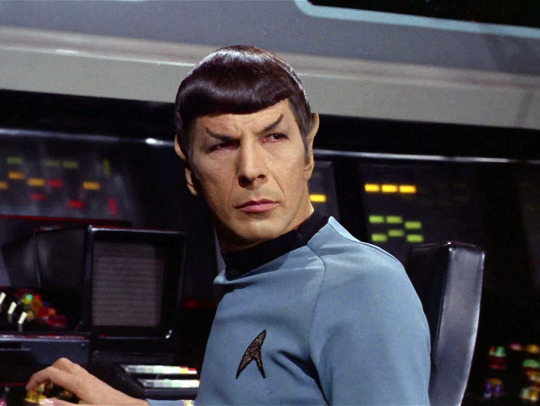
One thing of especial note in the original Star Trek show is that you could see characters visibly affecting one another. Kirk, Spock and McCoy all influenced each other in the ways they thought, reacted, and planned, and worked best as a unit. In this, the humanity of the main cast affected Spock in his slow, reluctant appreciation of human merits. In time, Spock began to make one or two decisions based on human logic, intelligence and emotion. In episodes like The Menagerie or The Galileo Seven, Spock makes decisions that seem out-of-character for him, based in emotion.
Spock is, in many ways, Star Trek’s best known and favorite character. The most visibly recognizable, as well as the most distinct, Spock is given more episodes exploring him than any other character, with installments like Amok Time and Journey to Babel, (the latter of which we explore his parents, and discover why it is that Spock has such a hard time with his human half) helping to examine Spock as a character.
The end result was a beloved science fiction icon, Kirk’s right hand man, an analytical, fascinating character as well-crafted and loved as Kirk himself.
Spock and Kirk are often remembered fondly, and are typically considered the most memorable and iconic characters of the franchise, but they don’t work alone. Their dynamic is as effective as it is because of balance. Spock is one extreme, and Kirk is the middle, but it’s no good without the other extreme: Dr. Leonard Horatio “Bones” McCoy.
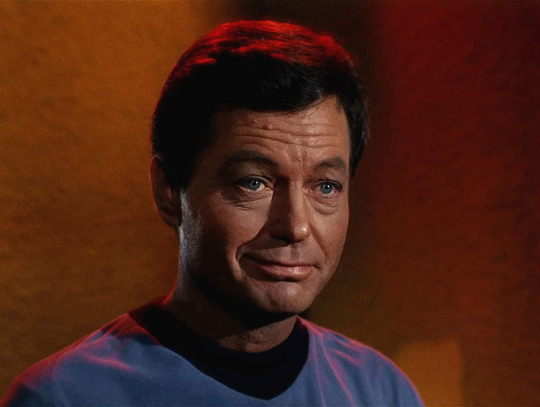
McCoy is all hot-blooded human, the third of the main Power Trio. An old-fashioned competent doctor who wasn’t entirely thrilled with deep space, McCoy is a deeply emotional character, duty-bound to follow his morals. He clashed with Spock regularly, routinely criticizing him for his perceived lack of emotion. Despite the fighting, McCoy respected Spock greatly, counting him as a close friend, despite their arguments and different perspectives. A cantankerous pacifist (though not above getting into the action when needed), McCoy is a Super Doc and a Sarcastic Devotee, a Grumpy Old Man who serves as the Heart to Spock’s Brain (hah!), a man who values Honor Before Reason who values the Good Old Ways. He’s a Determined Doctor who does everything he can for his patients, and a Deadpan Snarker to the point where he can match Spock in verbal sparring.
Bones represents the unpolished rawness of humanity, getting carried away with his emotions sometimes, but always with the best intentions. Another Jerk with a Heart of Gold, McCoy’s gruff nature accompanied a deeply moral man, very concerned with human empathy and doing the right thing. No philosophical discussion was complete without McCoy’s two cents, telling Kirk what he thought the right thing to do was. He was the quintessential Knight in Sour Armor, who would follow Kirk to the ends of the earth, complaining the entire way.
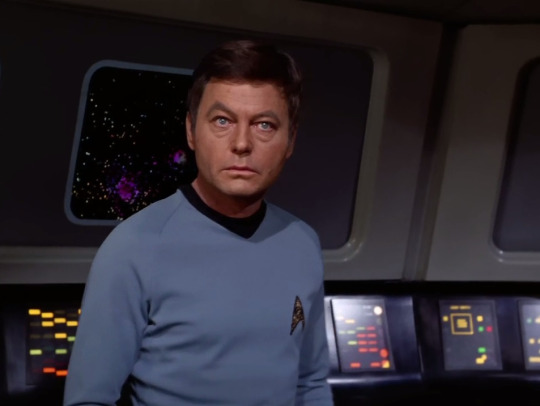
Despite the fact that he’s not as well-known as the other two members of the Power Trio, Bones was a vital component to the True Companions dynamic. His Vitriolic Best Buds relationship with Spock made up one of the most interesting and compelling dynamics on the show, serving as perfect counterbalances to one another. However, although his most famous role in the show was arguing with Spock (and delivering phrases such as ‘He’s Dead, Jim’), there is another, equally important position that he held in the trio.
McCoy served as a foil to Kirk, as well as one to Spock, a confidante, a close friend, providing perspective. While Spock was focused on the logic, Kirk on the best thing for the mission, McCoy’s focus was purely on the ‘patients’, the people, the right thing to do. No matter the situation, McCoy was the closest to empathy with the people involved, and provided the audience with another surrogate, saying the things that the viewers are thinking.
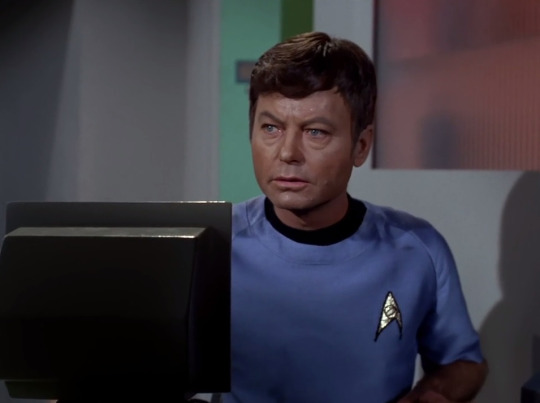
While not being a terribly big fan of space (and liking transporters even less), Bones was the epitome of the Frontier Doctor to the stars, taking care of every patient, even if they weren’t humanoid (Devil in the Dark) or a heavily pregnant woman who refuses to listen (Friday’s Child). McCoy was painfully human, reminding us of our most problematic traits while also holding onto that wild, fiery compassion that made him so incredibly humane, relatable, and understandable, making him just as vital to the Enterprise and her crew as Kirk or Spock.
The trio worked best together, providing a perfect main cast for an audience to follow. The formula was an interesting one, allowing the audience to hear separate viewpoints and ideas, listen in to the philosophical banter, and truly feel the strong friendship holding the leads together. The dynamic between them was powerful, an extremely vibrant bond that connected all three very different characters.
The result? Extremely dynamic characters that remain iconic and memorable even to this day.
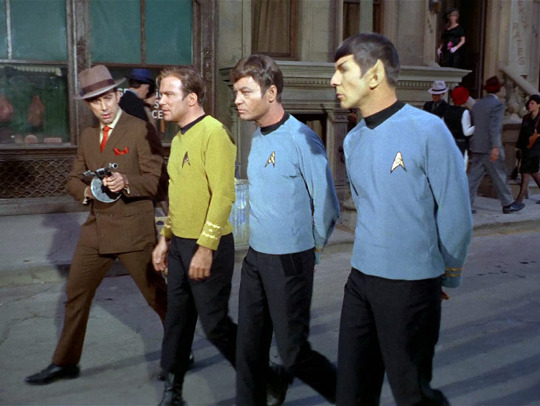
But the cast didn’t stop there.
The other characters of Star Trek, while not quite possessing the pop-culture iconography of the main trio, still hold their own rather impressive cultural footprint.
None more so than the chief engineer, Montgomery Scott.
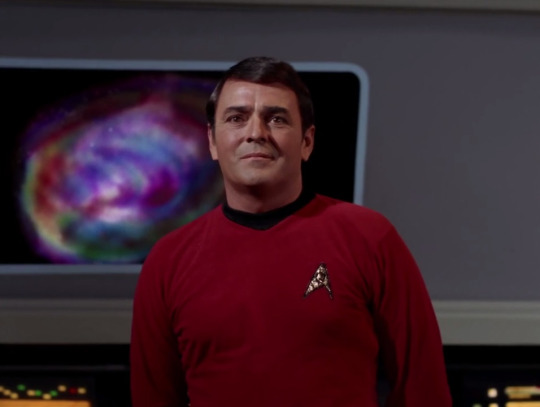
Scotty’s job was to be a miracle worker, solving impossible problems in impossibly small amounts of time. Whether it was the transporters, the phaser banks, the shields, or the engines, Scotty was the man for the job. Nobody had a better understanding, or love for the Enterprise than Scotty (except maybe Kirk). He was the king of outside-the-box solutions, and had the Enterprise jury-rigged to push her past her limits more times than can be easily counted. As the name implies, he was also Scottish, and extremely stereotypically so. Kilt, whiskey, haggis and all, Scotty was extremely proud of his heritage (though not quite as much as Chekov). Fitting the traditional stereotypes, Scotty had a fiery temper, with a Berserk Button triggered by any insult to the Enterprise. A Gadgeteer Genius (and the inventor of Scotty Time) as well as a Genius Bruiser, Scotty was both the brains and brawn, more than capable of holding his own in a fight, or thinking of a new, creative way to push the Enterprise past her capacity.
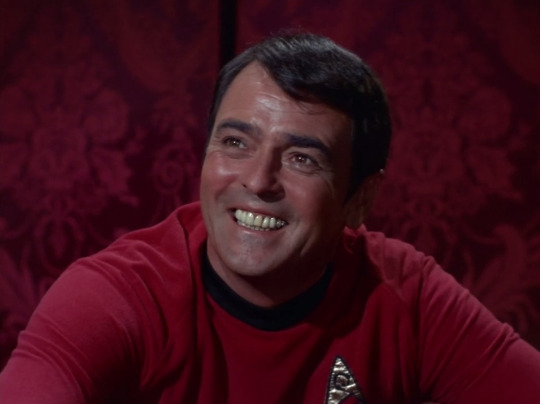
Scotty also held the distinction of being third in command, routinely taking the Captain’s chair when both Kirk and Spock were in the landing party. He was also the focus of a few episodes, making him a rare character with a Day in the Limelight, with episodes such as Wolf in the Fold, The Lights of Zetar, By Any Other Name, and The Trouble with Tribbles giving him a little more screen time and story than is typical. Scotty was an indispensable member of the crew, a life-saver on more than one occasion, and another of the legendary, iconic characters of the original Star Trek.
But it didn’t stop there.
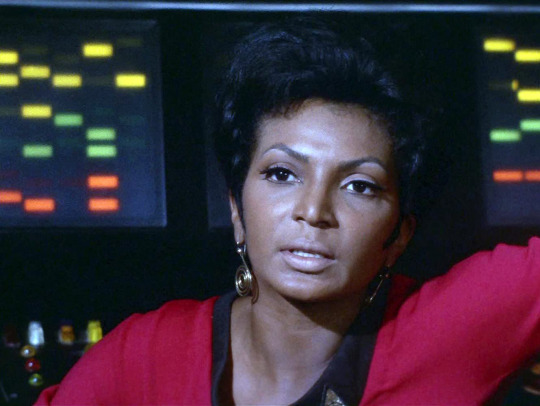
Lieutenant Nyota Uhura was another prominent character. As the ship’s communications officer, she codified the term ‘Bridge Bunny’, although she proved herself far more useful than she’s typically thought of. Whenever given the chance, Uhura is a capable Action Girl, intelligent, witty, and good at her job, being extremely fluent in multiple languages. She too got her days in the limelight, with episodes such as Mirror Mirror, The Gamesters of Triskelion, and The Trouble with Tribbles giving her more to do than just sit at her station and say ‘hailing frequencies open’. Uhura was Silk Hiding Steel, not typically in the heat of the battle, but tough as nails when she had to be. (I’ve talked about Uhura’s extensive influence on the real world in the Legacy article, but even that doesn’t scratch the surface of what Uhura’s impact has been.)
There were others on the bridge crew of equal importance, including the ship’s helmsman, Hikaru Sulu.
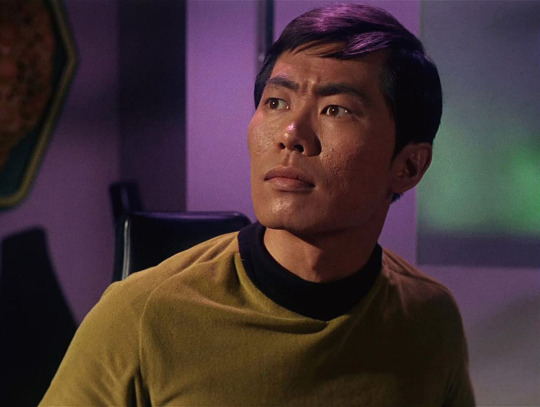
Sulu was a level-headed officer, amiable and cultured, with an extensive knowledge of botany, fencing, and antiques. Yet another Deadpan Snarker (it must run in the cast), Sulu is another Genius Bruiser, as skilled in fighting as he is in his piloting, with a great sense of humor. He is given special attention in episodes like Mirror Mirror and The Naked Time (Albeit as evil, and Brainwashed and Crazy), but often got great character moments in multiple episodes (especially Shore Leave). A reliable officer and loyal to the core, he made an interesting character by himself, although he did end up forming a fun ‘Those Two Guys’ dynamic with the youngest of the cast, Pavel Chekov.
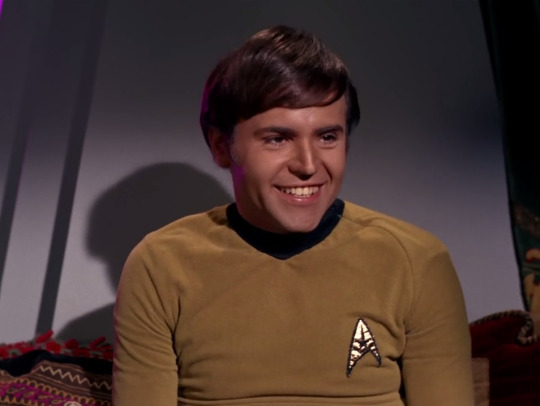
Chekov was introduced in season 2 as the navigator of the Enterprise. A bright young man with a fierce, passionate loyalty to Mother Russia (which evidently invented every good thing known to man), Chekov tended to be at the receiving end of a lot of the embarrassing agony in the series (mostly because Walter Koenig had a great scream). Also serving as a relief science officer, Chekov was plenty smart, if a bit of a Cloudcuckoolander, and the king of Cultural Posturing. Reckless and impulsive to balance Sulu’s calm good humor, Chekov’s temper tended to get the better of him. Like the others, he’s given a bit more screen time in episodes such as Mirror Mirror, The Trouble with Tribbles, The Way to Eden, The Deadly Years and Spectre of the Gun, but got to shine in plenty of other episodes, demonstrating his capabilities (despite being ‘The Intern’ and the Plucky Comic Relief) as a competent officer. Unsurprisingly, he was yet another Deadpan Snarker, lending his style of jokes well to bounce off of Sulu’s drier humor.
But there was more to the crew than the bridge.
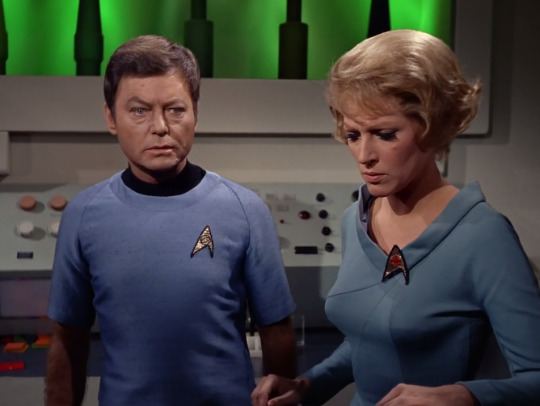
Another crew member of note was Christine Chapel, one of the nurses who operated in the sickbay. Chapel was notable for having an attraction to Spock, as well as being another in the long line of Enterprise Deadpan Snarkers. One of the most caring of the Enterprise’s crew, Chapel was given larger roles in episodes like The Naked Time, What Are Little Girls Made Of?, Amok Time, and Plato’s Stepchildren.
Arguably though, one of the most important characters in all of Star Trek was the Companion Cube: the Enterprise herself.
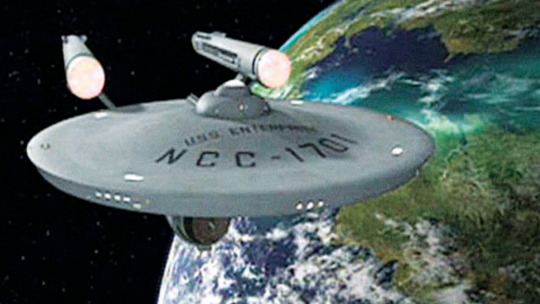
The Enterprise was one of the most powerful ships in Starfleet, a character in her own right. The epitome of the Cool Starship, the Enterprise was well known for Explosive Overclocking, and always coming through in the end (with a little help from Scotty). A Lightning Bruiser of a ship, the Enterprise became as legendary as her captain and crew, as beloved as the characters themselves to the point where one of NASA’s shuttles was named after her.
The characters of Star Trek are legends, both in and out of universe, and they are for a reason. No member of the crew is useless. Everyone has a purpose and a job to do, and each was distinct and unique. No two characters were the same, and each brought their own special personality and abilities to each episode they appeared in.
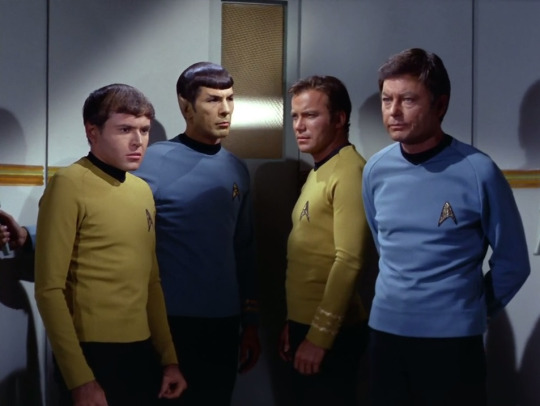
And that’s what made the drama of the show work so well.
Each character felt real, memorable and genuine. We as an audience worry for them with each danger, and cheer with each victory. We liked these people. We cared about what happened to them.
And they worked.
In each scenario and situation, the characters found new and interesting ways to deal with the circumstances, while never losing the core elements of their personalities. That’s important, hugely so. These characters were loved, and still are, for a reason. They work very well as characters, both in main and supporting roles, providing entertaining and compelling figures for the audience to invest in. The balance between relatability and entertainment was hit perfectly for every single character, allowing everyone to shine in their own ways in each episode. They felt real, and in the end, that’s the point of a character.
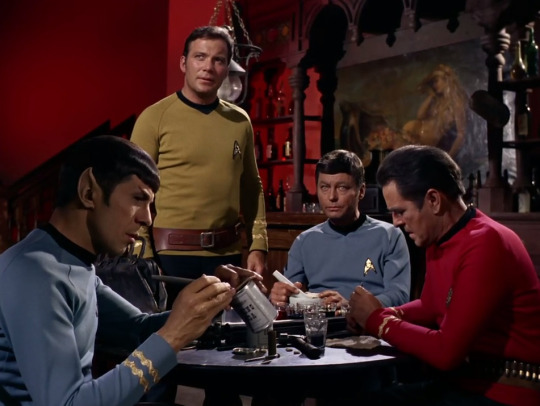
After all, one doesn’t get to be some of the most iconic television characters of all time by being boring.
Thank you guys so much for reading! Join us next time as we discuss Star Trek’s place in the times and the culture. If you have anything you’d like to say, don’t forget to leave an ask! I hope to see you all in the next article.
#Star Trek: The Original Series#Star Trek#TV#Television#TV-PG#60s#Drama#Action#Adventure#Sci-Fi#Science Fiction#William Shatner#Leonard Nimoy#DeForest Kelley#James Doohan#Nichelle Nichols#George Takei#Walter Koenig#Majel Barrett#Gene Roddenberry
133 notes
·
View notes
Text
An Analysis in Threes
❥ TAGGED BY: @emcads like 30 years ago
❥ TAGGING: @riidcr @starsailingcaptain @covencrown @hookd @all-fleshed-out @evermxre @motherofredemption @bup1957 @conquistadoradelmar @seaprofound @tcthinecwnself @withinycu @windguided @daevilhorns @concordia-cum-sinistro and YOU and I spent like 8 hours on this so pLEASE READ IT PLEASE I AM BEGGING I NEED VALIDATION I’M-
repost don’t reblog. yall dont have to type this much.
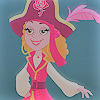
MUSE: Captain Red Handed Jessica
Three Strengths:
Her adaptability and resourcefulness. Is she brave, yes. Is she lucky, also yes. But over all, she can roll with the cards she’s been dealt in a way that many would call inhumanly clever. Her intelligence, her perception, and her charisma are all different ingredients of this indomitable characteristic of hers. She can see the value in just about anything and anyone, can pick up on clues and tangents few others can follow, and can remember seemingly endless details, tho unfortunately not on command. But even then, her patchy memory seems to contribute to this adaptability as well, as it usually allows for detachment. If she can find resources everywhere, it means she can survive everywhere. There have been countless times where the wheel of fortune has suddenly turned on her and she’d lost near everything and her response was more or less Damn, ok I need food water and shelter lets go. No food? Grow food. No water? Ask someone if they have water. No shelter? Sleep outside. No money? Steal money. Can’t hear anymore? Cool I can use loud weapons. Crashed on an island? My island now. Shot? Free bullet. She knows when to push, she knows when to quit, and sometimes she knows when to gamble based on her ability ( what a man can do and what he can’t do and all that ). Strong she may be, she knows its foolish to rely on strength. Survival of the fittest actually rarely means survival of the strongest. ( edit; this is the theme for the entirety of her character. I will say it 50,000 times. I am very sorry ). And as a student of philosophy and biology, she understands that phrase better than most. Leading to our next point.
Her understanding. As I stated, her charisma is something unmatched, and is a key element in all three of her strengths. This charisma might not exist as prominently were it not for her ability to understand. She has limited ( I’ll get back to that ) but deep running empathy and while not terribly observant all the time, she is always perceptive. Not only that, but she’s personally known abuse, hardship, and uncertainty, and understands that hate or anger can be rooted in similar pain. She was schooled lightly in both Christian and Buddhist values before diving heavily into democratic philosophy, meaning she believes all being experience suffering and therefore kindness is a powerful sign of strength, but also that suffering while free and equal is better than comfort in oppression. And between her sweet words and beautiful face, she can get most people to open up in ways they themselves my not have expected. Being very good with people means she can learn from them, gain something from them, lead them, and/or use them. But Jessica isn’t a manipulator in truth; her intentions are almost always kind or healthy ones. She absolutely uses people from time to time but not EVER without them consenting to or being made aware of such because again, unlike a manipulative person, she understands that can ruin a relationship and therefore ruin a resource. What it makes for is an excellent leader, a beloved captain, and a trusted ally at most and an excellent conversationalist at the least.
But her understanding isn’t just social, oh no. It’s academic as well. Armed only with his little library and the lessons of his own teachers, Jessica’s foster father tirelessly smithed her into a not just a girl who knew a lot of things, but a truly intelligent, thinking mind. He’d die before learning he’d succeeded tenfold. Jessica isn’t one to just except things as they are, facts or otherwise. She usually needs to prove it, experiment, see things from a new angle. Debates with her are fun! She has no issue admitting she’s wrong or confessing she’s never thought of it that way, and is actually wrong a lot of the time. It doesn’t bruise her ego, it excites her. It means there’s more to learn. And her ability to constantly understand new concepts paired with her ability to overwhelmingly understand people combine to make for a very powerful core idea of hers: We are fittest to survive because we all fit together. Our humanity, our empathy, our community are our strengths because they keep us united, which keeps us the fittest. No one is independent, no man is an island. People are power. And thus her final strength is just that.
Her power. While she and I still firmly state that strength isn’t everything don’t be disillusioned; its very goddamn important. And it’s something Jessica has plenty of. She is durable and clever because of her rocky early childhood, she is quick and versatile from her youth in a pirate port, she is physically strong and mighty from her years training in martial arts, and she’s an absolute crackshot after years of diligent practice with her trusty pistols. Her true strength may lie in her brains and in her allies yes, but even without them, Red Jessica is a powerhouse of a warrior. She can end fights extremely quickly or run from them without a prayer of catching her ( no shame in the later, both skills keep you alive ). And it may be in bad taste to say, but ever since loosing most of her hearing, Jess swears up and down it’s made her vision better, her reaction time faster, and her quick thinking even quicker. Yes of course she’s slowed down with age, but a bullet shoots at the same speed no matter how old you are. And you best hope she didn’t bring her firecrackers, because while sudden loud noises will absolutely temporarily discombobulate or debilitate an opponent with healthy hearing, it’ll hardly effect her at all and suddenly, you’re a sitting duck. You see those thighs? You see those calves? She can crush PINEAPPLES with them! People have seen her do it! Do you know how many micro-fractures broke and rebuilt those hands? Thousands! She can crush a trachea like a fucking beer can! She can kick you to death! One ill placed curb stomp and you are DECEASED. Sometimes she’ll just psyche you out because she KNOWS you know she can kill your stupid ass!
But while her strength, mental and physical, have always been there, her power is relatively new. As stated before, people are power. Not knowledge, not money, not strength. People. She’s a fearsome warrior but she’d be useless if outnumbered. Shes a very successful pirate, but she’d never make it out of port without a crew on her ship. She found a gorgeous island, but it’d still be wild without those who built it’s piers and buildings. She manages orchards and tends to them and harvests them herself, but she would loose all of her crop without the helping hands of her employed farmers. And like I mentioned, she deeply understands this. Freedom is not independence or vice versa. Did you make the clothes on your back or the fabric that made those clothes? Did you write the books you read to make you smarter or teach you that skill? Did you plant the seed years ago that grew that orange you’re eating? No, of course not. Jessica didn’t either. Another human did. We all need each other to fill the holes in our lives that we can’t fill ourselves. Humans are puzzle pieces in that way, there is no bigger picture or prayer for survival on our own. And because of this, we can do anything we as a community, as a SPECIES work together to achieve. There is no knowledge if there’s no one to learn from, there is no money if a society don’t give it value, your money is worthless if those you’re paying decide to rise against you, your role as leader only exists at the consent of those you lead, and your strength won’t save you from a sinking ship. People are, and always will be, power.
And as someone who is exceptionally strong and exceedingly smart, Jessica has slotted herself in the humanity puzzle thusly: The strong exist to protect the weak, the smart exist to educate, and the lucky exist so the unlucky may be given aid. And it is with this fairness and compassion that she has won the trust of so many. She has a great many friends and allies even outside of those in her crew or on her island. And she can make many more with ease. That kind of power is not a power to be trifled with, even if she can kick your ass six ways to Saturday without it.
Three Weaknesses:
She suffers ADHD. Now before ANY OF Y’ALL SAY ANYTHING, I myself also suffer ADHD. And yes I do say suffer because well that’s what it causes for Jessica and I, suffering. Yes, it is ableist language to say ‘suffering from’ rather than ‘has’ or ‘is diagnosed with’ and yes it perpetuates a stigma against us but god DAMN IT in both Jessica’s case and mine, it make life much much harder than it needs to be. At the end of the day, Red Jessica is a fantasy of mine; I pour myself into her whether I mean to or not. She’s the adult I wish I was, the person I might be if I had no anxiety, or brainfog, or lived in a world were I didn’t need a credit score or a degree. And even then, I can’t say I know anyone else’s problems better than my own. So if my character has problems, by sheer osmosis they are going to reflect some of mine. Both of the characters I write have ADHD because I have ADHD and I couldn’t even begin to know how a non-ADHD mind works to write it properly. And no, I’m not being dramatic when I say it causes me suffering. I can’t drive, I can’t hold down a job, I nearly flunked out of school, I still cant read very fast or spell very well, I am constantly overwhelmed by mundane things, I’m a slow learner, I forget very important things or recent things, I forget about things that mean the world to me, I forget about people, I stumble through tasks, I procrastinate hobbies and basic hygiene, and everything I do takes all goddamn day and I can only really do one important thing at a time and in order of importance. If I have a date at 4pm, I’m dressed and ready at 11am because I’ve gotta do the important thing first or else I will forget to do the important thing. I started typing this at a little before 5pm. It’s 7;30. It’ll probably be 10 o’clock at night by the time I fucking finish ( edit: l m a o its 1am bitch you thought ). I’m 26 and am just medicated enough to barely function. So yeah. Suffering is the word.
Though for Jessica, perhaps suffering is a tad strong of a word. Her ADHD affects her ability to function in far less debilitating ways ( though whether that’s a result of a less severe diagnosis than me or the result of the society, situations, and responsibilities she functions in and around are far different from mine, who’s to say ). For her, she has very consuming hyperfixations that can last anywhere between weeks to decades, a spotty memory that is detail and memento oriented, she’s scatterbrained more often then not but can focus with amazing clarity on her interests or in high adrenaline situations, is is ABYSMALLY bad at math and EXCRUCIATINGLY bad with numbers ( as opposed to me, who is good at numbers but shit at spelling or reading ), she can forget anything no matter how important it is to her or to anyone, she’s bad with names and dates, is COMPLETELY time-blind, has trouble prioritizing, and of course, wile not actually that materialistic, she absolutely has the ol’ magpie instinct.
While her poor memory assists in her adaptability and ability to move on, it also means she forgets things she needed to remember, like when the last time she bathed was and who this person is and what happened between her and someone else or what conversation’s shes had. Unfortunately this means she’s a very good friend and leader... while you’re around and interacting with her on at least a weekly basis. It’s almost a lack of object permanence in both a social and very real sense. If something is not right in front of her, odds are she’s not going to think about it. And while its something she constantly kicks herself for and actively tries to be better about, it applies to people too. Face to face is the best way to interact with her; she won’t think to write you and in her modern verse she won’t think to ever call and she’ll text you back in perhaps a few days. She doesn’t value you any less, I promise. She’s just either distracted or overwhelmed. Also, for someone as understanding as her, she is surprisingly self-centered. Not selfish, self-centered. She’ll talk about herself more than she should, and will assume people understand that she’s doing so as a form of showing empathy rather than bragging when they may not know this at all. Actually she accidentally assumes all the time. It was far worse when her hearing was functional; she’d finish your sentence for you or guess what it was you were going to say ( again, not to talk over, you but to show she understands you and the conversation, tho it usually came of as annoying or patronizing ). Sometimes she mistakenly assumes you believe or know the same things she does without even realizing it. Maybe she perceives the right idea off of someone but isn’t observant enough to notice anything past that. And while she is willing to change her mind about things, she might change her mind a tad too quickly. She’s an over-sharer and is horrible at keeping any kind of secret. Romantic relationships tend to fizzle out. Her impulse control is improving but has a VERY long way to go. She’s always chasing something new.
All and all, when you’re a pirate, a librarian, or even a captain, all of these things may be irritating and inconvenient, but are overall manageable in chunks. ...But as a governor to her island, as a leader of an entire population... oof. In the position of leadership that she’s in, she can’t afford to make too many massive mistakes, and she knows this. ‘There is no power quite like the power of being underestimated’ is a phase you’ll hear her say a lot but for her, there is a shift in connotation. If people expect less and you do more that’s a great upper hand in any situation but for her, it was a safety net. Having ADHD sometimes means going months or years being fine and then eventually you fuck up and everyone around you wonders how in the world you managed to do that. She has only barely avoided disaster more times than she’d like to admit. Even with the resourcefulness, the understanding, and the power she wields, she’s finally starting to realize that she’s bit off more than she might be able to chew, with the entire well-beings and livelihoods of others on the line. And she fears that one day she’ll play her cards wrong and everything she’d built, everything she’s done, will all come crashing down in ruin.
She is Hard of Hearing. This one is literally as simple as it sounds: she has moderate and degenerative hearing loss and tinnitus after years of canons, explosions, gunshots, and a definitive, scale tipping attack in her early 30s. Her ears just don’t work at all like they used to. The whole world sounds like it would if everything was underwater: she can’t pin point the location of sounds, how far off or close sounds are, and barely registers changes in volume. And it only gets worse the older she gets; one day she won’t hear anything at all. And while yes, again, it might be very harsh and ableist to say, the truth of the matter that being deaf a “ weakness ” more often than its a strength.
That said, it very well can be a strength. I’ve already mentioned that trick with the firecrackers and let me tell you it is a DAMN EFFECTIVE TRICK. Shes around explosions and canons and guns all the time and now she can focus while being around them five times better than she could in the past! But unfortunately it also means she’s very easy to sneak up on, she sometimes isn’t aware of danger until it’s nearly too late, no one can get her attention or warn her across any distance, it’s very easy to escape from her, and it’s easy for her to be just... left out of things. She might hear you talking, but she has little to no idea what you’re saying without sign or lipreading. Some people don’t have the patience or even just the courtesy to speak slower, or clearer, or repeat themselves a lot. Though, those last too thinks aren’t weaknesses of hers so much as they are the weakness of others, but they still negatively affect her self esteem and her effectiveness as a leader.
All of this has taught her to pick her battles carefully, and plan around the elements of surprise and discombobulation. And while communication was tricky at first, it only got easier, and now she can talk to you almost like anyone can, so long as she’s looking you in the face.
That damn bleeding heart. We have established a number of things that should easily add up to an overly empathetic, trusting, fight-the-good-fight, martyr-some, idealistic pushover; she believes humanity and kindness are strengths, she has taken on the role of leader and then a provider, she has known suffering and tasked herself with ending the suffering of others to the best of her ability, she lacks the clarity of mind to assume people aren’t just as good or capable as her automatically, she can have poor impulse control at times, she wants to have relationships, and ( while I never stated this outright yet it can be inferred ), she believes that being able to see yourself in others is the foundation of humanity and ( as i did say outright ) humanity is what keeps us unified and unity is what makes us fit and strong. Keeping up? Good. Here’s the curve ball: How can she whole hardheartedly preach and believe all of this, to the point of it being the foundation of her character, WHILE BEING A VIOLENT THIEVING AND BLOODTHIRSTY PIRATE?! HOW, MANGO? HOW IS THIS POSSIBLE?! MAKE IT MAKE SENSE!! Ok, fine, sure, I will. I’m sure about one half of you are looking up from the screen and going “ Oh yeah, wow I totally forgot that bit. “ and the other half got about two and a half paragraphs in before squinting and silently calling bullshit. So let me explain.
In short, she’s a detached hypocrite and is well aware and unashamed of her hypocrisy while far less aware of her detachment. I’ll cover both: Western culture as a whole seems to be under the impression that hypocrisy, despite context or importance, is automatically bad. I don’t know where this comes from personally ( my bet is Christianity but I have exactly 0 evidence ) but its a very... flawed idea. Take the freedom of speech vs racism problem; say you owned a bar where all could speak their mind freely over cold drinks. Excellent concept without context, right? Sure. ....Then a die hard racist covered in slurs and symbols walks in and orders- what are you going to do? The correct answer is to throw him out instantly. Not let him sit so long as he doesn’t cause trouble, not just ignore him and hope he doesn’t return, you throw him out. Is it hypocritical? Yep! Sure is! But it is also 100% necessary to protect your other patrons because if you don’t, the racist starts feeling safe and bringing his racist buddies, literally everyone else starts feeling unsafe and starts to hang out elsewhere, and two months later, ta da! You now own a n*zi bar and there is literally nothing you can do about it. Jessica is in a somewhat similar situation. You as a pretend bar owner need to make a decision as who to let into your bar and who to throw out for the good of all of your patrons. Jessica too is faced daily with that decision. If she want’s to help as many people as possible, the only realistic way she can do that are by protecting those under her leadership... only. She is surrounded by hateful, angry, sneaky, traitorous, abusive, or otherwise evil people. Piracy as a profession and poverty in general can do that to a person. Of course there is a clear difference between those down on their luck and desperate, and the truly cruel and twisted, but unfortunately both types of people yield the same wrongdoings. It’s absolutely her nature to extend a hand to anyone and everyone but.... she just can’t anymore. Too many times has her trust been betrayed, too many times has she gotten in peoples business trying to be helpful, only for her to absolutely bite her in the ass. Too many time the extended hand is bitten and once or twice, she’s actually made things worse.
Now, she will only help someone she loves, someone under her leadership, or someone who seeks her out. That’s it. And even then, sometime it manages to bite er in the ass. But she had to set that hard limit for herself out of necessity, one she does her absolute best to adhere too and... these days she adheres a little too well. That leads us to our next point; what I was alluding to at the beginning of her Understanding essay when I said she has limited but deep running empathy. That detachment again, courtesy of a very unattached mother and unchecked ADHD. ( It isn’t a strong enough characteristic to even rank as a strength or a weakness but damn if it isn’t an undercurrent to a lot of her motivations and experiences. ) Strangers are fair game that she tries to ignore, but if she even perceives you as a threat, you could be in danger. Like anyone used to violence or perhaps anyone trapped in an us verses them mindset, she can just... flat... turn her empathy off. Not on command, she’s not a socio or psychopath persay. But she has become totally numb to the horror of violence via her warrior upbringing that, in her mind, violence can actually be rather fun. Pair that with the fact that she purposely tailored herself to only be empathetic to her allies and boom. You get a kindhearted killer. Cops and soldiers in our world do it literally every day. Actually anyone can do it really, even you if you tried. You don’t have to be evil or even angry to kill or steal or lie... you just have to believe you’re right.
Three Secrets:
WHAT SECRETS?! LMAO this bitch is the oversharing queen!! I’ve been typing and pondering her character for literal hours ( its currently 11:16, fuck you adderall ), and I still can not think of a single goddamn secret. There is nothing about her that at least five random people don’t fucking know about!! The only secrets she has are secrets she knows about other people and even then she is!! literally the worst!! She spills her guts left and right and yet she wants to be a mysterious bitch SO BAD like BABE I love you, you’re precious, but you are a dumbass attention seeking validation chasing adhd CLOWN girl!! Stop telling random people about your hermaphroditism or your dairy allergy or your dead dad or that time you fell asleep in a barrel like that is literally your uber driver Jessica honey come ooooon. I’m skipping this section mom holy fuck.
Three Fears:
What if she does wrong by everyone who trusts her? As stated at the end of the ADHD essay, she’s terrified of failing those she leads. Where it as simple as personal failure, she’d be fine. Ever if her entire world came crashing down on top of her she’d either die or start back from square one. Death is a fact of life and her adaptability means she can just dust herself off and move on, so neither her death nor her failures really scare her... But it isn’t just her life and happiness at stake, is it? Not anymore, right? What started as a leader of a small gang of rebels became a full crew, then a crew became a slew of allies, then those allies built a town and now... now she’s the governor of the Crimson Isle and there are nearly twenty five HUNDRED lives at her mercy. HER mercy. One really, really bad mistake could ruin their livelihoods or spark disorder and disloyalty. And if she died? Would whoever it is that will take her place be as good to them as she is? Is she good enough to begin with in the first place? Every day the paperwork gets a little bit thicker, every year there’s a new baby or two. And the isle has fertile soil sure but will it last? Are they prepared for a raid or a hurricane? And if Jessica trusts the wrong people, where her people right to trust her? ...can I protect them? Can I protect them?! CAN I PROTECT THEM?!
Who am I if I’m not interesting? This is, literally, an entirely subconscious fear. She’s not at all aware it exists and therefor this entry is short. But between her short time with her very unimpressed mother, her own ADHD, she is constantly hungry for attention without even realizing it. She must be interesting and intriguing and engaging, and I did mention she wants to also be mysterious. She wants not so much your input or even your validation - but rather if shes not perceived then.... is she really there? Remember, she is unaware of any of this. And fortunately she’d never been starved for attention to act out over it in the first place, even when her disinterested mother was alive. Look at her; she’s radiant, she’s beautiful, and she’s 6′4 / 195 cm shredded and covered in cool scars. Without even opening her mouth, without even her colorful clothes, she’s kind of automatically interesting. So she’s never been so desperate for attention that she acts out because she’s never been without it for very long. But it’s there. Hungry, aching, silent. Those years after the M branding were horrible and she could never really explain why. She still throws parties, organizes festivals, and talks to damn near anyone who will listen. Look at my art! Look at my library! Listen to how much I know! Let me tell you how lovely you are! Look at my scares! Look at my hair! Look at me haha, please, please look at me.
GHOSTS. NOPE. No. NO. Fuck ALL of that noise. Stay dead, go to hell, eat a dick. Red Jessica is a scientist and superstitious atheist. As an academic and somewhat bi-cultural woman she simply thinks there are far too many religions with far too much history for any of them to be considered The One True Thing You Must Believe Or ElseTM and she tends to not truly believe anything until she finds some kind of proof. Shes not afraid of the unknown, shes thrilled by it. She’s not afraid of death or the afterlife, that’s beyond her control. She’s only superstitious because she does believe in and value luck, and also its a bit of a cultural habit. BUT IF SOME SHIT STARTS MOVING ON ITS OWN OR IF SHE SEES SOME BULLSHIT IN THE CORNER OF HER EYE THEN SHE IS OUT OF THERE. OUTIE 5000. She has heard the tales of lost souls from purgatory or the eternally ravenous Pret or dangerous Phi Tai Hong or the tragic and startling Banshees or the creepy Santa Compana and she wouldn’t believe a word of it where it not for one thing.
SHE FUCKING SAW ONE. She’ll never forget it, it was the first and last time she EVER attempted to plunder a tomb all Skyrim style and at first she thought it was one of the crewmean being creepy as shit until she got a good look and he was SEE THROUGH AS SHIT AND SKINNY AS FCUK AND SHE GOT LITERALLY CHASED THE FUCK OUT OF THAT JOINT. She does not CARE that some ghosts are just apparitions she does not CARE that some are friendly and trying to warn her of something if you are MOVING and DEAD at the SAME time get FUCKED. If any of y’all cringe try-hards bring a Ouija board to the party you are getting SENT HOME and BLOCKED. NO CAP.
Three Goals:
She really only has one left. Listen its... almost 1am and ive been typing since like 5pm i think i covered goals somewhere in here but ive gotta throw in the towel but even then I’m kinda being serious. Her only remaining goal is to find a suitable heir of some kind. She wants what she’s built to fall into worthey hands but she could never seem to find a good parter and even when she did she couldn’t sustain a pregnancy ( you’d think that would be a huge deal but it hardly mattered to her oddly ). So at 50 the option of having kids is out but there’s still plenty of hope for either adoption or a protege. But then again, she’s so busy these days that she hardly prioritizes it like she wants to.
holy shit i need some water...
#i.... i did it.. its done.. its DONE#...this took my entire saterday#i will literally pay yall actuall dollars to read all of this please... it took so long i dont want it to be for nothing qwq#x; EVER PLAYED CRAZY EIGHTS? { dash games }#x; QUITE THE PIRATE GAL { portrait }#x; WHY AREN'T YOU A CLEVER ONE? { meta }
9 notes
·
View notes
Text
Callum—A Hero’s Journey
Some of you may be familiar with the concept of the “monomyth,” also called the Hero’s Journey. In comparative literature and mythology, the Hero’s Journey is a common template for a wide variety of tales that involve a hero who goes on a decisive quest, triumphs over their foe, and finally returns home changed or transformed. The concept of the Hero’s Journey was popularized by Joseph Campbell in The Hero with a Thousand Faces, so much of what I will quote below comes from this work.
The Hero’s Journey is seen everywhere in pop culture—the Lord of the Rings, Star Wars, Harry Potter, ATLA…and also in the Dragon Prince.
But often in these stories, only a privileged few become heroes. Often they are born to a royal bloodline (like Ezran), have innate special powers (like Rayla), or become a knight in shining armor (like Soren). Their journeys are imbued with cosmic purpose; they follow a hero’s journey because they were destined to.
Very rarely are these stories about someone like Callum, an ordinary person with few talents, who has no bloodline, no destiny to speak of, and no assigned place in the grand scheme of things. Yet his storyline, up through the end of Season 3, has followed the “monomyth” precisely. This could mean that Callum is actually the true hero of our story.
Let’s break down the steps of the Hero’s Journey and apply them to Callum’s arc:
The Ordinary World
Every hero's story begins in the ordinary world. Without this introduction to the hero's life before the adventure begins, there would be no character arc that shows how the hero has changed by the end. During this stage, we find our hero in a state of rest, home in their safe place. They are oblivious to any adventures to come. In this stage, we learn details about our hero, their outlook on life, their true nature and capabilities. We see our hero as human, relatable to ourselves. Identifying with our hero in this stage allows us to empathize with them later.
After a short prologue, the Dragon Prince opens with Callum, the step-child of King Harrow. We are introduced to Callum as a sheltered and bookish prince. He’s fairly awkward, and apart from art, he is shown to be terrible at most other tasks he tries. Nonetheless, he lives a normal life before the Moonshadow assassins arrived. We learn of his love of sketching. We learn that he is, for the most part, good-hearted. We learn that he is just a child, like we all once were.

The Call to Adventure
As Campbell writes, the hero is called to venture “forth from the world of common day into a region of supernatural wonder.” Here, this “call” comes as Rayla chases him across the castle, followed by Ezran showing his discovery—the egg of the Dragon Prince.
The revelation that the egg survived is the call to adventure.
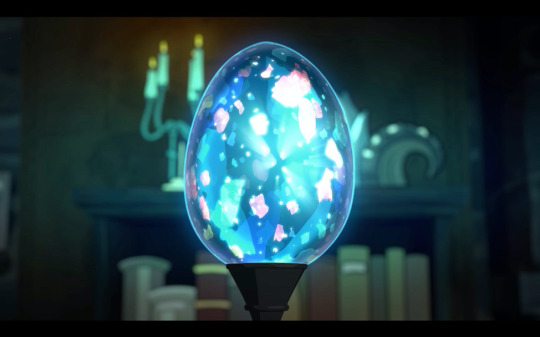
Rayla: This changes everything…I can’t believe it. If the egg lives…
Callum: Maybe it could stop the war.
The egg must be brought back to Xadia, a region of supernatural wonder. Callum is being called to this world, reminiscent of what Campbell describes as “…a fateful region of both treasure and danger.”
Crossing the First Threshold
This is the point at which the hero decides to embark on the adventure and cross over into the unknown, leaving their ordinary world behind. And in spite of having the option to go back for his father with Rayla, Callum decides saving the Dragon Prince is what matters most:
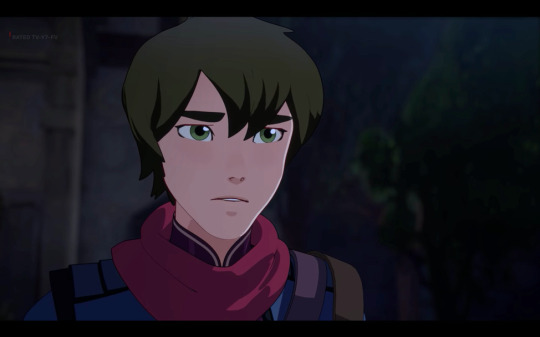
Callum: “It’s up to us now. We have to return this egg. We have to keep it safe and carry it to Xadia.”
However, here the “crossing of the threshold” takes place very gradually; Team Zym spends most of the first two seasons in the Human Kingdoms, and it’s only in 2x09 that Callum and Rayla finally make it to Xadia. But from the moment that Callum leaves Katolis Castle, he has left his ordinary world behind and entered into the adventure beyond.
Supernatural Aid/Meeting the Mentor
Once the hero has committed to the quest, help arrives either in the form of an artifact…
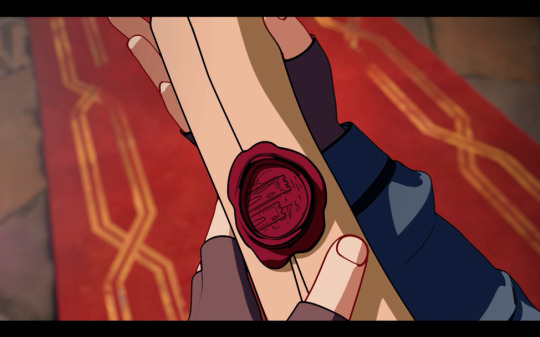
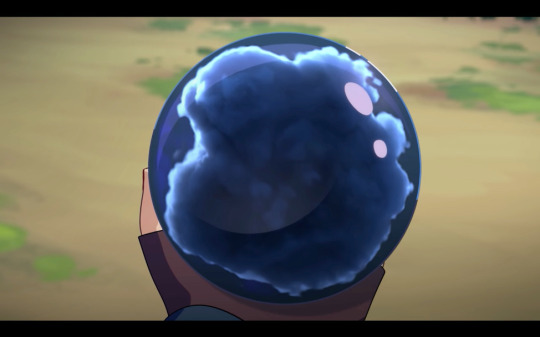

…or help arrives in the form of a person who may present the hero with gifts or important advice. This person has been to the unknown and understands what the hero is up against.
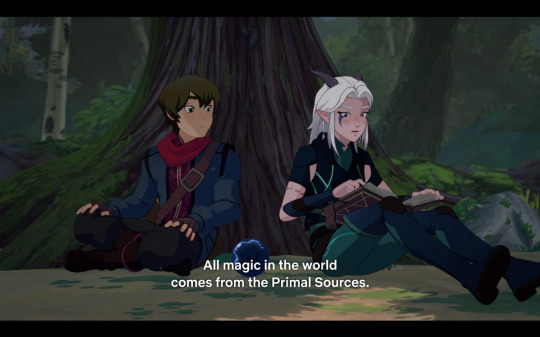
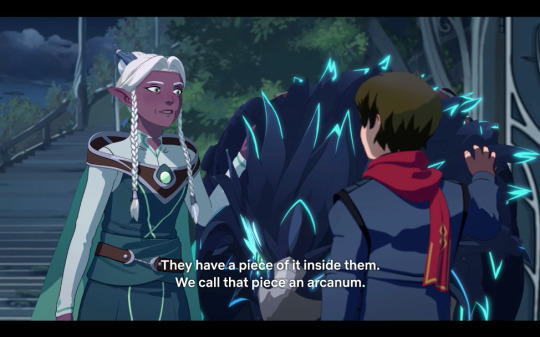
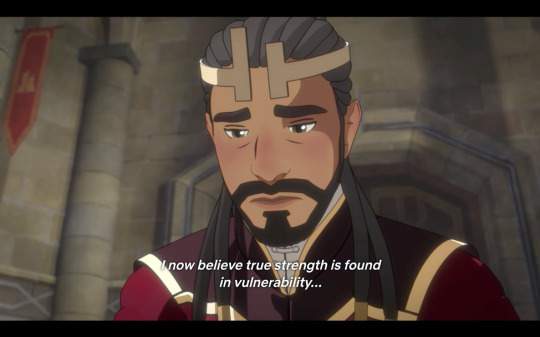

The Road of Trials
The Road of Trials is a series of tests the hero must face to begin the transformation. Here, Callum is tested when:
He must choose whether to sacrifice his newfound power (and sense of self-worth) so that Zym could be born.
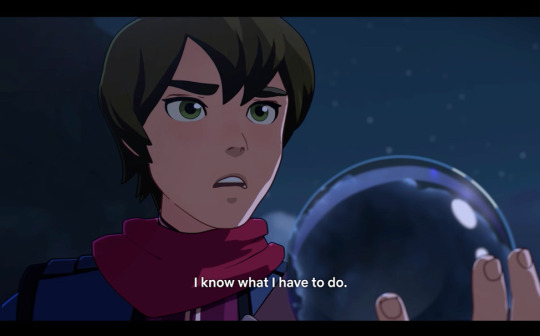
He must decide whether to reject the temptation of Dark Magic, and that his life is bound to any destiny.
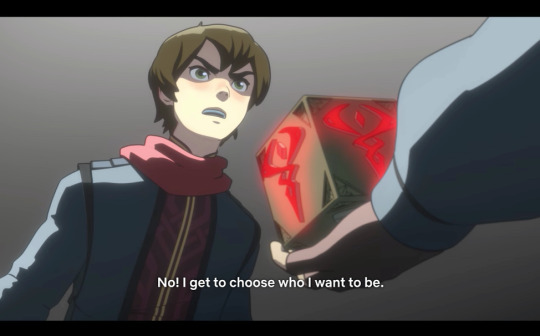
He must choose whether to take Ibis’ advice to leave the Storm Spire.

And he must choose whether to take the leap and try to save Rayla’s life, knowing he himself could very well die too.
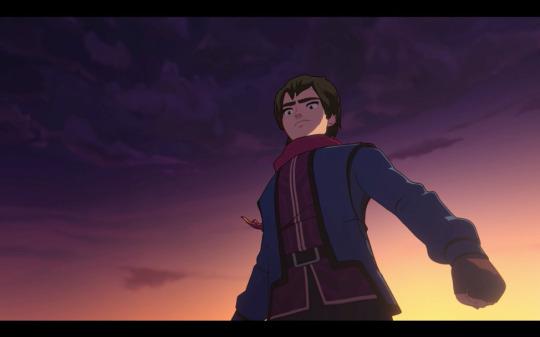
In addition, there are several smaller tests as well, including, among others: Whether Callum should tell Amaya the truth about Rayla; whether he should trust Rayla with the egg; executing a plan for the journey up the Cursed Caldera; the hardship of learning his stepfather had died and deciding whether to continue the mission; journeying through Xadia, the Midnight Desert, and up the Storm Spire; and using his magic and emotional openess to help Rayla find closure with her parents.
But in the process, the hero will fail many of these tests.

Refusal of the Call
Even though it’s more common in modern stories for the hero to jump at the chance for adventure, traditionally they refuse to continue, or even begin, the quest. The hero has fears that need overcoming, second thoughts, or perhaps deep personal doubts as to whether or not they are up to the challenge. When first called a mage by Rayla, Callum’s first reaction is doubt and skepticism (“Who, me? No, I’m...I’m not really anything”).
Later, Callum has a moment when, due to his feeling inadequate, he flatly rejects his place in the story. Fear and self-doubt prevent him from continuing his journey.


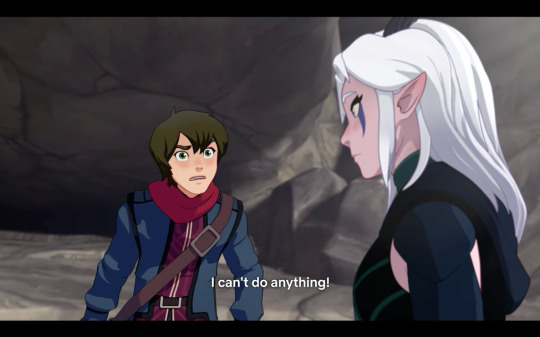
The Woman as Temptress
This is the stage in which the hero faces temptation that will distract them from the ultimate quest. The temptation doesn't have to come in the form of a woman. It can be anything material that distracts the hero from what they have set out to accomplish. And here, Callum faces the same temptation that every human mage has had to face:


Atonement with the Hero’s Father
As with the metaphor of being tempted by a woman, this step also represents a metaphor of facing the one who holds power over the hero. In some stories, this could be a literal father (such as with Luke Skywalker and Darth Vader), but in many cases, the person who holds the most power over the hero…is the hero himself.
The hero confronts that which holds power over them and defeats it. Here, Callum confronts his darker self and takes aim at the idea that his “destiny is already written.”
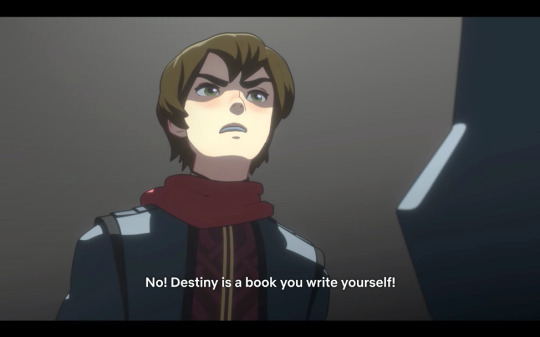
The Belly of the Whale
At this point on the Hero's Journey, the hero, “instead of conquering or conciliating the power of the threshold, is swallowed into the unknown and would appear to have died.”
After resolving to be the author of his own destiny, Callum continues his fever dream, voyaging into his “own heart and mind” on a ship where he is the sail. Eventually, instead of being able to brace the storm in his own subconscious, his ship is smashed to pieces and Callum sinks below the waves and begins to drown.
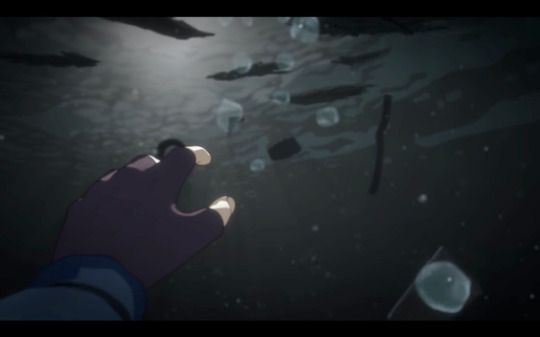

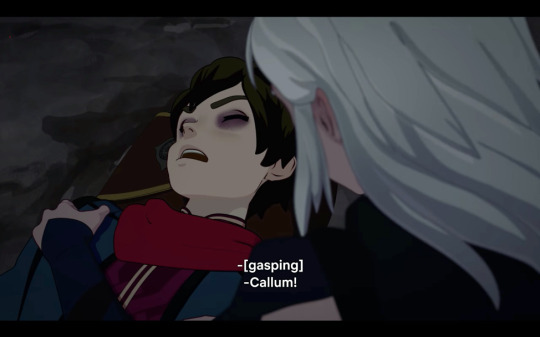
Meeting with the Goddess
This stage doesn't have to have a goddess, per se, but rather a significant power that gives unconditional love and strength to the hero. Here, on the verge of suffocating, there’s one person that Callum turns to for love and strength.

The meeting with the goddess “is the final test of the talent of the hero to win the boon of love, which is life itself enjoyed as the encasement of eternity.” And it is here, in the presence of his mother, that Callum finally learns the secret of the Sky Primal.
Callum: I just have to breathe?
Sarai: To know something truly and deeply, you must know it with your head, hand, and heart. Mind, body, and spirit.

Apotheosis
This is the point of realization in which a greater understanding is achieved. Armed with this new knowledge and perception, the hero is resolved and ready for the more difficult part of the adventure.
And it is at this point that Callum, awakened and enlightened, becomes the first human in countless lifetimes to make a connection to a Primal Source.

The Ultimate Boon
This is the final stage of the Hero's Journey in which the hero achieves their goal. Here, Callum finally masters Sky Magic, represented by the one ability which we most associate with dominion over the sky:
Flight
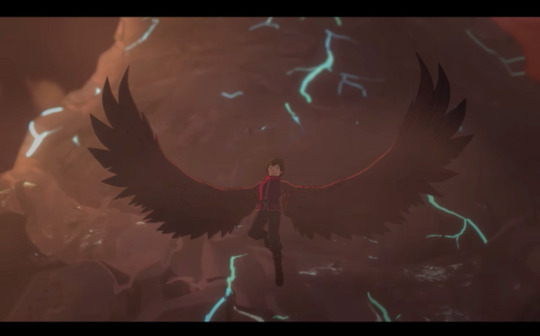
Everything that happened prior to this was to test and purify the hero to get him to this place. And just as Callum completes his transformation into a powerful mage, the Dragon Prince is finally returned to his mother, greeted by a group of humans and elves, in a gesture that signals the end of the millennia-long conflict.
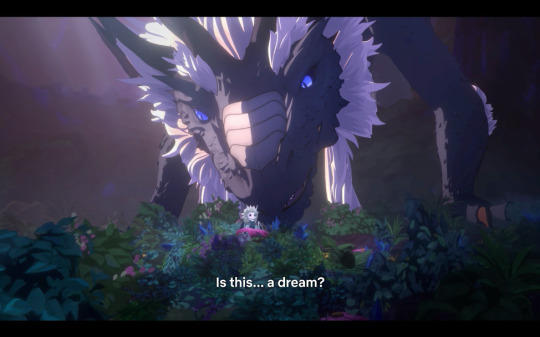
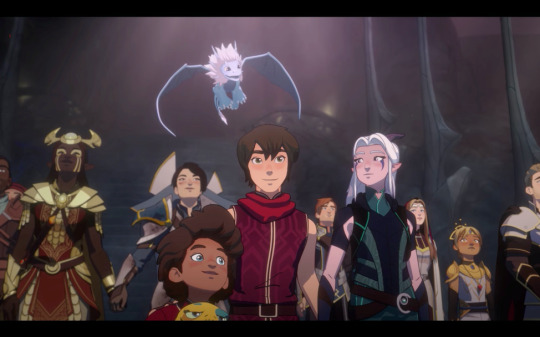
#callum#rayla#ezran#rayllum#claudia#soren#harrow#moon shadow assassin#ibis#lujanne#sarai#primal magic#sky magic#dark magic#zubeia#zym#sky arcanum#s1#s2#s3#tdp#the dragon prince
64 notes
·
View notes
Note
Hi can i get a general reading. I feel stuck.
A💕
Thank you
Note: I don't usually do these kinds of free reading to people, but this time, I just had to. For your reading, I used beyond lumeria for the oracle reading later this one.
You have been very tired these days. You're family or maybe life in general is pretty well off, there is something new that came to your life. You don't really like it, it's almost like you feel lonely and trapped. You also feel sadness and grief. There are also arguments? I'm getting but I'm not too sure. You have become closed off. You don't show anyone your current situation. You feel defeated, but you won't tell anyone. You made a barrier between someone, I'm guessing parents for now. I'm not sure but maybe a new stepparent came in and you didn't like that. The parents are strict, this is just something that came up, but there's a possibility that you're coming out of the closet. If it's true, congratulations. But, if not, don't mind this.
What should you be aware of?
Vulnerability
When you are truly honest with ourselves, in all facets, we are vulnerable. That honesty is an important step in discovering our shadows and bringing them into the light for healing. When we share our vulnerabilities with others, we allow them to glimpse a deeper part of ourselves. Be vulnerable with yourself and others. It may be time to step into the role of healer and hold space. Holding space means being fully present, without judgement, in a way that provides a safe and nurturing environment. Here, guards are dropped, a deeper level of awareness and relating can unfold and profound healing takes place.
What can you grow from?
Unique Gift
We all have gifts to bring to the world. If we all did what we truly excelled in and enjoyed, our talents and abilities would enable our communities and our planet to thrive. If you haven't connected with your purpose, look at your quirks and what they are telling you. What makes you unique? Look at the positive sides of your oddities and traits. Things you have considered shortcomings might be qualities that enable your gifts. Are there things you'd like to try or feel pulled to explore? Now is the time to follow these whispers (heart)- you never know what they may reveal.
Where should you put your energy?
Earth Star Chakra: Initiation
You are standing at a gateway into the unknown with trust in your heart, ancient remembering in your souls, and inner illumination to light the way. You have access to the seat of creation, the spark of existence, and the codes that hold the blueprints of who and what we are. This place is clear and grounded, despite moving through multidimensional realms and able to bridge worlds while functioning in physical reality. The higher you reach for the Divine and the realms of Spirit, the more important it is to anchor deeply to the Earth.
2 notes
·
View notes
Text
Read This When You Are Finding It Difficult To Love Yourself
Loving yourself, means coming back home to yourself.
In a world that sometimes convinces us we have to change, or edit ourselves, in order to be loved, it is so important to reintroduce ourselves to our own souls again. If you are struggling with fostering self love, try asking yourself who you truly are, deep down. Ask yourself what you like, and dislike. Ask yourself how you want to feel when you go out into the world. Ask yourself what your non negotiables are, what your standards are, what you never want to settle for again. Really think: Who are you when you’re alone with your mind? When you’re not trying to be everything for everyone? What genuinely makes you happy? What ignites you?
And while it can feel overwhelming to sit with yourself in that way, while it can feel so foreign, it’s a great first step towards showing up for yourself. When you love others in your life, you want to get to know them on the deepest level in order to be able to love them the way that they need to be loved. So when it comes to a relationship with yourself, you need to know yourself on that level too, in order to love yourself the way you need to be loved.
Forgive yourself for who you had to be in your past.
It is unbelievably easy to look back on the things you had to do in order to survive, or heal, or the mistakes you made, or the person you were in your past, and allow for all of that to make you feel like you aren’t good enough, or deserving of what you want. Our pasts can bring up feelings of shame, and that shame can often make you love yourself less, because you are seeing yourself through the lens of who you used to be.
If that is one of the reasons why you find it difficult to be kind to yourself, why you find it difficult to care for yourself, I want to remind you that life is really hard. And there is no perfect way to execute our existence. It is never as black and white as we think it is. There is no guideline on how to be a human being who is dealing with the grittiness of what it means to simply live, and love, and make mistakes. We have all been versions of ourselves that we wouldn’t necessarily clap for now. We have all been the person who hurts, or who makes the wrong choice, or who can’t show up. This doesn’t make you a bad person. This makes you human.
So a step towards loving yourself is forgiveness. Forgive yourself for what you had to do in order to kill your sadness. Forgive yourself for how you settled, or allowed yourself to be treated. Forgive yourself for the ways in which you didn’t fight for who you were becoming. Forgive yourself for the ways you tried to catch your footing. When you call it all by it’s name, when you truly face all that it was — not with the desire to change it, not with regret, but with tenderness for what has come and gone, for what cannot be reversed, forgiveness affords you this ability to reframe your past. It affords you the opportunity to stop seeing your present self through that lens, and you learn from it, rather than letting it hurt you or demean you or belittle you. You take the lessons, and you allow for them to inspire you into standing up for who you are and who you want to be. Acceptance is love.
Loving yourself means respecting yourself.
In order to love ourselves, the distance between who we are internally, and who we show the world, has to be nonexistent. There should be no gap between those two realities.
Try your best to be honest with yourself about who you are, and don’t ever edit yourself. Because when you stop yourself from speaking your truth, when you silence yourself in order to appease everyone around you, you bankrupt yourself. You become a shell of yourself, and that can make you feel really trapped and misunderstood, because you aren’t being true to yourself. You aren’t creating the art you want to create, you’re not loving how you want to love, you’re not showing up the way you want to show up, because you’re scared of being fully and openly who you are. There is a disconnect between your desires, and your actions.
Remind yourself that who you are on the inside is worthy. And who you are on the inside is a beautiful human being that the world would be lucky to know. You don’t have to edit yourself in order to be accepted or loved or cared for. You don’t have to change yourself. You just have to be unapologetically who you are. You have to do the things that make you happy, on a soul level, and you have to do them almost foolishly — don’t ask for permission to be who you are. Stand in your power.
That kind of freedom is life changing, because you’re respecting yourself. And when you earn your own respect, you stand firmly in who you are. You know that you aren’t being dishonest with yourself, or editing yourself down, you know that you’re showing up for yourself. You’re being kind to yourself. You’re being proud of who you are. As you are.
Trust the process, and invest in yourself.
You are a human being who is learning and growing each and every day. You do certain things really well, you have talents and beauty within you that is rare and that is yours and yours alone. And you have a lot of work to do, as well. A lot of things you have to heal, a lot of things you have to come to terms with and accept. Life isn’t ever going to be void of those things. That is why it is important to try your best to love where you are even if it isn’t where you want to be right now. It is important to show yourself some grace, to trust in yourself and in the process.
When you trust in the process, when you understand that this journey back home to yourself, that this journey towards being who you want to be, and loving yourself throughout it all, when you do all of that, you learn how to invest in yourself.
And investing in yourself looks like planting seeds within your life that you know are going to bloom, no matter how long it takes. It’s about setting yourself up, about doing the hard work. It’s about showing up for yourself.
So ask yourself — how can you show up for yourself right now? What can you do that you will look back on and feel proud of? Sometimes that looks like being healthy, even when you don’t want to. Sometimes that looks like limiting your social media use so you can get your visions and your ideas sorted on a foundational level. Sometimes that looks like doing the things that would be easy to just ignore, sometimes being able to show up for yourself in that way — to really motivate yourself to do the work, is how you show yourself love.
And this also means showing yourself love by healing, even when it hurts. By really digging into the soul of who you are and doing the deep work, the hard work; unhinging your ribcage and peering into all of the baggage and all of the wounds and slowly learning how to carry it, how to clean it out, how to confront it and let it go. Showing yourself kindness, especially when it isn’t easy, is the best way to show yourself love.
Pay attention.
Pay attention to the things that make you come home to yourself. The things that make you happy, the things that bring you to life. Ask yourself — what brings you joy? Who are you with when you’re the happiest? What are you doing when you feel the best? When was the last time you felt truly alive, truly free, truly open to the world, without judgement, or fear? When was the last time you felt clarity in your heart, like you were being empowered and inspired to love yourself? What ignited that kind of beauty in your life? Chase that. Fill your life with those things, and those people.
Make sure that you are paying attention to the goodness, that you are taking inventory of all of the things that make you feel deeply. But make sure that you are paying attention to the opposite, too. Who makes you question yourself? Who makes you feel like you are hard to love? What do you do in life that genuinely lowers your energy, that drains you or makes you feel like you aren’t good enough? What is stealing your joy, your ability to see yourself as someone who is deserving of the same love they give to others?
Cut yourself off from those things. Walk away from those things. Please, whatever you do — be honest with yourself about what hurts you, what makes you feel small, what isn’t serving you any longer, and have the courage to walk away. Not only does that feel empowering, but it will change your life, and create space for you to chase that which does set your soul on fire, that which does make you feel love for yourself and your life.
Remember —
you deserve the love you give to others.
Think about all of the ways you love others, the ways you forgive and celebrate them. Think about all of the energy you expend being kind to others, being a good friend, being the kind of human being they can depend on. Think about the ways you encourage the people in your life, the ways you forgive them for their mistakes, the ways you motivate them to embrace their flaws, the ways you show them just how much they can be loved not only when they are shining examples of who they want to be, but when they aren’t themselves or when they’re going through difficulty. Think about all of the ways you love others unconditionally, and unapologetically, the way love pours out of you for everyone around you, how tender and how patient and how forgiving and how kind you are to those you care about.
Now ask yourself, why don’t you do that for yourself?
We show up so deeply for those in our lives and we forget to show up for ourselves. We love others so unconditionally, and we forget to give ourselves that same love. We forgive others for being human, for making mistakes, and we rarely do the same for ourselves. We speak kindness into those we love, we celebrate them and encourage them and we only ever want for them to have the sunniest, most beautiful, kind of happiness in their lives, and yet, we don’t afford ourselves the same tenderness. We don’t celebrate and encourage ourselves.
We have the capacity to be our own safe havens, we have the capacity to be our own home, we have the ability to encourage and care and love, but somewhere along our journeys we convinced ourselves that we weren’t worthy of it. That we didn’t deserve it.
So this is your reminder — you are deserving of the love you give to everyone else around you. You are deserving of your forgiveness. You are deserving of your grace. Your kindness. Your tenderness. It’s time to take all of that belief and invest it into yourself. It’s time to see your own worthiness. It’s time.
42 notes
·
View notes
Text
Finale take
It took me a few days to finally put my feelings on the finale and how it impacted me into words. It actually helped a little bit to write some of it out, cathartic almost.
It hurts.
I found this ridiculous show and its fantastic, remarkable fandom many years ago. It helped me to cope when I was feeling at my very lowest, struggling with my depression and my anxiety. It helped. I didn't feel so overwhelmingly alone. It actually did help.
A big part of that was due to the characters and their constant determination to go their own way, to keep fighting against destiny. I found bits and pieces of myself in them.
Sam and his studiousness, his thirst for knowledge.
Cas. Castiel. His awkwardness. His always trying to find a way to follow his heart. To do right. His struggling to accept himself. His want of finding a place to belong.
But Dean. Oh Dean. I could, or would, never claim to share all of his traits, but I don't think that I've ever seen so many sides of myself in a fictional character, at least there is none other I can think of right now. His stubbornness. His dorkiness. His silliness. His sarcasm. His trying to find joy in small things. His compassion. That soft, caring heart so deeply hidden. His ability to love so intensely, but not really express it in words. How much he hurts. How deeply tired he is. His intense feelings, and the reluctance to put them into words. His ability to hold a grudge for so long. His bisexuality, though never truly canonicaly expressed in words, it was still so obviously there for those of us who saw ourselves in him, and seeing that helped me to come to terms with my own, to realise it and see my self in a different way, and to start to tell others about it. His protectiveness and the need to take care of a younger brother, to protect him from family conditions that were less than ideal - my situation far from Dean's, or what many others have to go through, but it was still more than a young child should have to bear.
I have always become incredibly, and perhaps overly, invested in characters and stories. It has always been my way of escaping when reality became overwhelming, frightening, or just too much for me to handle. There have been so many characters and stories that have made an impact on me, that have helped me cope through my most difficult and lonely times, so many that I have cared for and loved. But these three? These three with their fighting for themselves, each other and the world; these three with their personalities, with all their quirks and faults; these three with their perpetual struggles and their found family? They hit differently. When I had the most difficulties of even liking myself, I liked and loved and wanted better for them - and that in turn somehow helped me believe that I could actually be allowed to feel a little bit better myself. That seeing parts of me in them and still love them, could possibly mean that perhaps I could deserve to feel better and perhaps could leave the flat lined, grey limbo my life had become. Eventually I got help and could get my life back on track again. But this ending hurts. Of course it hurts.
Underneath the soul crushing sadness and the furious anger, I just have a feeling of betrayal that has been seeping through every aspect of my life in the past week. It is unfathomable to me that could do this. To end the show like this. It is a betrayal to the actors who have lived with these characters for so long. It is a betrayal to the crew who throughout the years have worked to bring this show to the screen and to give it life. But most of all it is a betrayal to the characters who fought so hard to live life on their own terms and to us. To all of us who have ever seen any part of us in them, whether that be the main characters or in someone who only showed up a few times. And that is because representation matters.
Representation matters and heaven knows that Supernatural has had its fair share of problems with diversity, regardless of if you think about it in terms of women, BIPOC, queerness, physical disabilities, or mental health issues. I'm not saying that other shows don't have these issues, because they do and there is probably no such thing as a perfect, unproblematic show. I'm not trying to negate the feelings or experiences of fans of other shows (or even that of the people who actually enjoyed the ending of Supernatural - good for you). I know what it is like, I have been here before, burned before.
It is a gigantic problem that television in particular, and media in general, has failed to fix. Progress has been made, but we are still a far way off. Ultimately I do believe that the majority of the problem lies with the networks that somehow fear of no longer appealing to the general audience and thereby advertisers, of being seen as niche, of fear of losing money. That they don't realise that they are more likely in the long run to lose audience and money when long-term fans are less likely to rewatch anything they dislike the ending of, and of fewer new people tuning in for something they've heard others be discontent with, why would they be wanting to see something where they aren't able to see themselves represented. Why waste all of your precious time and money on something that in the end are likely to leave you feeling disappointed and / or unseen?
Stories and shows are still allowed to have an unhappy ending. Of course they are. For some it is even necessary, an unhappy ending can still be a good ending to the story. That's not the point here. The point is that the story of Supernatural did not have a good ending, no matter whether you see it as happy or unhappy. It was, in my opinion, illogical and went against everything that they had built towards for years. Perhaps I am too naive or maybe I have read too much meta on this show and analysed it too much over the years, but I chose to trust what my eyes saw and my mind was telling me. I chose to believe what I have learnt about storytelling through all the movies and TV I've seen and all the books I've read. After all that fighting and doing everything to break free from being a spiteful and bored god's playthings to in the end saying "screw free will, it is impossible to escape your destiny"? That is an illogical ending that doesn't care about its story's legacy.
So here I am. A grown woman upset over the ending of a long running TV show and the fact that the characters who brought me some kind of joy when I was feeling my lowest and whom I saw myself in didn't get resolutions that made sense. Can you really blame me for being hurt?
#supernatural#spn finale#sam winchester#sam winchester deserved better#cas#castiel deserved better#dean winchester#dean winchester deserved better#we deserved better#representation matters#family don’t end with blood#spn analysis#suze says#long post
7 notes
·
View notes
Text
Eagerness and Gentility - Chapter 5 - The Morning After
Synopsis - Lady Charity of Edgewater is the daughter of Earl Vincent and Countess Maria and is slowly learning her place as the heiress to the Edgewater. As she comes of age, her father wants her to explore life and consider courting. When she starts to court the broody Mr Sinclaire, the person she grew up with, the Earl and his mother hope the young heiress is on her way to finding a husband, but will they stand back or will they not be able to help themselves and meddle in her life? And will Ernest be the man Charity expects after a life of devotion and affection at her fathers hands? And what happens when people try to split them up? Can they make it through?
Pairing - Ernest Sinclaire x Charity Middleton (Desire and Decorum)
Series - Eagaerness and Gentility AU - Series Masterlist
Rating - General
Taglist - @drakewalkerfantasy @ao719 @princess-geek @polishchoicesfan @binny1985 @desireepow-1986 @adriansbiss @i-bloody-love-drake-walker @desireepow-1986 @hatescapsicum @itscassandral @gardeningourmet @thequeenofcronuts @kaavyaethanramsey @imonlybibecauseofethanramsey @regencylady1810 @waitingforalana @dailydoseofchoices @storyofmychoices @sanchita012 @ramseysno1rookie @sushiharrington @akshara16 @choicesficwriterscreations
————

Summary - The morning after the kiss, Charity is confused and Maria is concerned about her daughter
Word Count - 1469
—————-
It was the morning after the dinner and the morning after she had kissed Ernest and Charity was full of emotions, she had this tingling excitement to find out what the kiss meant to Ernest but there was also this dread in her stomach, what if to him it was a mistake? She had tossed and turned all night, it had been such a emotional night and she was just wanting to talk to her father over it all. She needed to get someone else’s input, she needed someone to rationalise what had happened. What was this feeling she felt, was she deeply in love with Ernest Sinclaire? Was love this aching dizziness that she felt? The strange feeling she had in her stomach, it was overwhelming.
“Charity, my dear, are you ok in there?” Dominique called for her granddaughter, it wasn’t a while till breakfast but Charity had usually made her way downstairs by now and she was usually so excited to have breakfast. To start her day right. Charity jumped slightly, she hadn’t expected to be interrupted. She jumped, her heart was thumping in her chest.
“Ummm, I’m ok- sorry I’m just a bit tired” she spoke and the Dowager Countess chuckled, her granddaughter had a huge night last night.
“Don’t worry, my dear, I just wanted to know if you were ok. Father was wondering” Dominique spoke and Charity felt her heart explode, was she ok? She had no idea. Her grandmother sighed to herself, a smile threatening to come out. “Just come out and have some breakfast when you’re ready my dear, you have a horse ride this afternoon with your father” Her grandmother left her and Charity was irritated with herself, she never ever ever forgot about her rides out with her father, they were her favourite things. She got dressed into a delicate dark blue dress, with a shawl. She would change into something more suitable. She walked out her room, she walked down the stairs, she was floating, she had a smile on her face. The staff noticed it, she may feel so confused but on the outside, she looked as if the best thing ever had happened to her. She looked as beautiful as usual with that gorgeous glow to her.
Maria and Vincent were talking in Vincent’s study before breakfast, Maria was pleasantly surprised by the events of the previous night, she was so thrilled for her daughter but she was weary.
“I don’t know if I should be overprotective, she’s 18 Vincent” Maria fussed as she watched her husband read through the estate books, Vincent hadn’t stopped grinning. He was so keen for his daughter to find love and if she could find it with a man like Ernest Sinclaire.
“It’s Ernest, Maria. Not some stuck up, sex driven noble man who wants Charity for Edgewater, and if they were to fall in love, he is a man who would be suitable to allow her to inherit Edgewater” Vincent spoke as he stood up but Maria frowns.
“Back to my original point, Vincent, shes not even 20!” Maria argued and Vincent sighed, they were both so protective of their daughter, their only child but Maria feared they were pushing something on their daughter that she wasn’t ready for. She knew Vincent was even more protective then she was but for this situation, their daughter falling in love, he was slightly more calm.
“Maria, we have discussed this may times with her and between ourselves, we will not force her to do something she wishes not to. I just want her to be happy” Vincent assures his wife and she sighs.
“Shes our baby, our everything” Maria responds, and her husband presses his lips to hers.
“I know, I will talk to her on our ride later, and I am sure she will talk to you if she needs it” Vincent assures and the Earl and Countess walk through their house to where the rest of the family are preparing to eat breakfast. Vincent smiled to his daughter, she had her wavy hair flowing over her shoulders and looked like she was glowing almost.
“Good morning Father, Mama” She beams and kisses her mothers cheek then she kissed her fathers and hugged him, it may not be good to show affection to a parent in-front of others but with how close the two were, he really did not mind and the Foredale’s were used to it, they had a very special bond.
“Good morning, my darling. I trust you slept well” Maria says softly and Charity nodded but looked as if she had the weight of the world on her shoulders. Maria gave her husband a look
“Father, can we play cards today? So when the Sinclaire’s come again I can play with Ernest and know what I am dong” Harry asked and the earl looked at his son.
“Of course but after dinner, my boy. I have to do the accounts later and I am going to go on a ride with your sister as well today” The earl says and harry nodded.
The family were silent for a few seconds before the Earl cleared his throat. Charity was glowing but her parents and grandmother could see the weight of the world on her shoulders. Love was a hard thing, the Earl and Countess knew that above anyone. But seeing the confusion being in love on their daughters face was hard, they just wanted to help her.
“Last night was a pleasant night” Dominique spoke up and Maria nodded as she chewed on her egg before she turned to her mother in law.
“Yes, I was shocked by the behaviour displayed by Felicity however, I don’t understand what she has against our daughter” Maria admits as she looked to her husband and he sighed agreeing.
“I think she could be jealous, as Charity will one day be the lady of Edgewater, its her birthright” Vincent guesses and Charity blushed, she knew the conversation her and her parents had so many times, she was to marry a man of status to get her birthright, she was a woman after all,
“I understand that Vincent, but Charity has never ever been rude to her, she is a polite young woman, she has not a rude bone in her because we raised her to be polite” Maria replies sipping her tea.
“Charity, you have been awfully quiet my dear, are you alright” Her father gently rubbed her arm as he asked her. The attention was on her now. She blushed and looked down, her leg moving back and forth slightly under the table, whatever happened between her and Ernest had her puzzled.
“I am sorry father, I just am tired” Charity admitted Her father rubbed her arm softly. He knew what her thoughts were at the moment, he remembered the experience he had as a young man, when he fell for Maria. The way his heart hurt when he thought about Maria and the way she took over his every thought.
“We don’t have to go for a ride today, we can do it another day” Vincent offers and Charity shook her head. She needed to talk to her father about her feelings and admit she kissed Ernest. She needed to be away from Edgewater, away from the gardens where the kiss happened so she shook her head.
“No, I want to. I need to ride Princess Callie, I miss riding her” Charity said, too quickly and her mother shot her father the look. This is what Maria feared the most, the sadness for their daughter, the constant sickness that came with being truly in love for the first time.
After breakfast, Charity went to read before she prepared for her ride with her father and Maria and Vincent returned to their chambers.
“I told you, she is beyond confused, she is hurting” Maria says and her husband sighed.
“I know, Maria, I know. But I will talk to her, we will help her. As her parents. As her mother and father” Vincent argued as he sat on the bed.
“You need to talk to her, assure her this is naturally and ask her what she wants to do” Maria insisted, she shook her head, her husband nodded in agreement, he walked to his wife.
“Of course I will talk to her. Shes my little girl. I want to help her”
Over at Ledford park, Ernest was less nervous about the night before, instead he realised the night before must have been destiny. And he wanted to love her the way she deserved. He loved Charity and he wanted to show her he did. He went out on his horse for some fresh air, to think of ways to woo her.
#choices stories you play#pixelberry#choices#fanfiction#choices fanfiction#choices desire and decorum#choices ernest sinclaire#choices ernest#choices mr sinclaire#mr sinclaire x mc#mr sinclaire#d&d ernest x mc#d&d ernest#mr ernest sinclaire x mc#ernest x charity#ernest sinclaire x charity mills
16 notes
·
View notes
Text
Queen of the Ashes | extended author’s notes
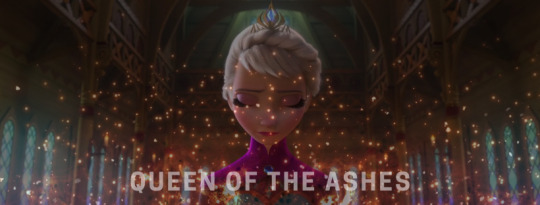
In which I delve into the themes, symbolism, and creation of my latest fic.
Foreword
I’ve been writing in the Hans/Elsa fandom since 2014 now, and yet, to my surprise, had never delved into the world of the “Hans with fire powers” genre. I’d enjoyed the art and fics for it, but didn’t have a good idea of what to write on the topic myself, though the idea percolated in my mind that I should, at some point, contribute to it. After bandying ideas back and forth with a friend off-Tumblr, the first line of the story came to me: “They met as children.”
Fics about Hans and Elsa meeting pre-Frozen are also common in the fandom, and to my mind, the notion that they would have met before completely changed how they would interact during the coronation sequence (and “every moment after,” as Hans might say himself). Add to that the notion that Hans, like Elsa, had secret powers – in addition to all their other shared experiences, which the fans elucidate through fics and art and posts – and it creates a new and tantalizing dynamic to tease out over the course of many chapters. It also begged the question, to me at least: even if they had met when they were kids, and realized some of their likenesses, could they still have successfully overcome their individual traumas as adults?
I had promised, for some time, that I would explain in full the background behind this fic, including symbols and themes which readers may have missed along the way. In particular, I am aware that the Epilogue may have unsettled or taken unaware some of them who had enjoyed the quasi-happy ending of the preceding chapter—a phenomenon which I was well aware might happen from the very beginning. It is therefore my hope that the following notes elucidate some of the mystery of the story, and why it ended the way it did. (And I’m tagging @yumi-michiyo, who helped me to summarize my thoughts more cleanly in discussing them with her.)
Theme: abuse (and its consequences)
There are many allusions in Queen of the Ashes to various types of abuse experienced by its main characters: parental and familial; physical and verbal; intentional and unintentional; organizational and relational. While some are described in an overt manner with little ambiguity, others are less obvious, but no less malicious in their impacts on the character.
When reading into the various traumas of the characters, it is easier to ascribe value judgments to the actions of certain characters over others. It would be difficult for anyone to argue that Hans’s father and brothers, for example, weren’t terribly abusive towards Hans; likewise, it would be hard to ignore that the insistence of Elsa’s parents for her to “conceal, don’t feel” had tangibly negative psychological consequences on their daughter, regardless of their good intentions. The consequences of such abuse on both characters are obvious: towards themselves and their powers, they are taught to feel fear, anxiety, discomfort, denial, and confusion; towards others, they can be perceived as childlike and their decisions arbitrary and cruel, cynical of the outside world, unable to trust, and blaming all else but themselves for their troubles.
On the flip side, the abuse which Hans then inflicts on Elsa – pursuing her in spite of her telling him to leave (on multiple occasions), leveraging family connections (Anna) to pressure her into speaking and meeting with him, taking advantage of her self-doubt and fear to convince her to trust only him, lying to her about his true nature and his past misdeeds, pressuring her to continue hiding her powers up until and even after they are married – is in many ways subtler, disguised as him trying to help her accept her powers and herself (even as he tells her that no one else will accept or understand her, except him). They are also characteristic of the deceptions deployed by the character in canon to achieve his objectives, even if they were, originally, used on Anna (whom he also lies to in this story, for other reasons).
It is understandably harder to view Hans’s actions in the same light as those of his parents, or her parents, as we are led to believe that he truly does care about Elsa in this story, and feels a special kinship with her on account of their shared miseries and strengths. I am not here to say definitively, one way or the other, if he cares about her or doesn’t; that is always up to the readers to decide. The point is rather to illuminate how difficult it can be to tell deceptions from truth when the deceptions are told from a sympathetic perspective, and when the deceptions appear to be borne from circumstances so harrowing and tragic that the readers might be inclined to forgive them their trespasses against other characters.
When viewed in the context of their upbringings, we can more clearly see the full cycle of abuse: that which was perpetrated against our protagonists, and that which they, in turn, can and do perpetrate against each other. In attempting to break this cycle, and start a new life with Elsa, Hans ends up playing into similar patterns of manipulation and coercion with her, her family, and her people which he had internalized over many years of suffering the same. Whether he does this on purpose or inadvertently is up for interpretation, but still beside the point, which is: in trying to be the opposite of his family, and then in killing that family, he begins to resembles them.
Theme: perspective
As in several other of my fics released over the last few years, this story experiments with narrative and perspective, describing to the audience the events of the story through only one character per chapter. For the majority of the story, we are shown events from Elsa’s perspective (Chapters 2-8 and 10), and given special insight into her years of isolation and accompanying mental distress. No other character is allotted as much time and room to think and develop and reflect on everything that is happening to them, as Elsa is; and yet, at the same time, we are rarely allowed all the way in to see and know her thoughts in each moment beyond the whispers of “conceal, don’t feel, don’t let it show” that echo through her mind, in empty rooms, and from her own lips.
We are mostly shown her reactions to things that are happening to or around her, and given vague descriptions otherwise about “off-screen” moments like meetings or public hearings where her attention is not fully present. Upon a second reading, it might become more difficult to be certain about what exactly is going through her mind, especially towards the end in Chapter 10 and the Epilogue (in which we are removed from her perspective entirely, and see her only as Hans does).
In Chapters 1, 9, and the Epilogue, by contrast, we are shown events from Hans’s perspective: as a child, then chronologically from childhood through adulthood, and finally just after he is crowned King of Arendelle and married to Elsa. We first meet Elsa and Anna through his eyes and experience his pain, though the source of it is not confirmed until later in the story. When we finally learn about his powers through the confrontation with Elsa in Chapter 8, we are briefly allowed back into his perspective in Chapter 9 in order to experience his ordeals and better understand his motivations.
With so little “screen time,” however, it is difficult to know or understand Hans in the same way we think we do Elsa. We trust him when Elsa does (or perhaps before, if we are sympathetic to the child Hans from Chapter 1), and believe that his version of events as recounted in Chapter 9 must be true and accurate due to their disturbing nature. Even when we are presented with evidence which suggests that his actions aren’t as pure and good as they seem (see notes on the symbolism of roses, apples, and gloves below), we are unlikely to question the validity of his memories and intentions towards Elsa, since, as the victim of severe abuse, we cannot fathom that he would inflict the same on someone he appears and claims to deeply cares for.
It is easy to forget, in these switching perspectives, the complexity and development of the characters, and how certain aspects from earlier on in the story – such as Elsa’s initial suspicion of Hans and his motives – might return even after the “happy ending” of Chapter 10. A common critique of romantic comedies (and Disney movies) is that they end just as the relationship is about to begin—the relationship being the more difficult part of the story to explain and understand, with less romance and more compromise and bargaining.
The Epilogue therefore serves as an antidote to this trope in asking: what would actually happen after Hans and Elsa came together? How would he publicly court her, given his sour reputation? How would he help her to control her powers, while still keeping them (and his own) a secret, and convincing her to do the same? If they decided to get married, how could they continue to keep it a secret? Could Elsa ever truly forgive and forget Hans’s past misdeeds, and cover up his crimes in perpetuity?
And, perhaps, the kicker: Did Hans ever really care for, or love, Elsa during the course of the story—or does he just see her as an extension of himself and his own trauma? Did Elsa love him in return? Can there be love without trust?
It is impossible to answer these questions wholly when the chapter is presented only from Hans’s perspective, as it is; and even if it were from Elsa’s, we would still be missing half the story. In place of seeing both points of view at once, we are left to put the pieces together ourselves of what happened in the year between Chapter 10 and the Epilogue, relying on our knowledge of both characters’ actions from earlier chapters in the story to make sense of their final decisions and feelings.
Symbolism: roses
Roses play an important symbolic role in the story, and feature both in Chapter 6, during Hans and Elsa’s conversation in the rose garden of the castle in Arendelle, as well as in the Epilogue, wherein Hans offers Elsa a rose made of flames during his proposal (which she then turns into ice).
Hans, comparing Elsa to a rose in Chapter 6, frames it thusly:
“You know, Elsa,” he began, “roses are actually rather difficult to grow. The conditions have to be just right, with plenty of sunshine, well-drained soil, and in areas free from pests, since they’re so susceptible to disease. Without regular attention, it’s unlikely they’d survive.” He eyed her pointedly as he added: “So it’s a wonder that these are still here, and blooming as beautifully as they are.”
The unspoken implication of this analogy is that Elsa, as a delicate and fragile flower, must be taken care of and tended to. Thus, the paternalistic warning underlying his speech is that she will decay without proper handling, and that he is the one who can handle her. Even when Elsa rejects this perspective and the analogy itself (“I’m not a rose, Hans. I don’t require sunlight, or pruning, or ‘regular attention’ to endure”), a feminist reading of this scene might say that he still forces her to take on the feminine duty of caring for him when he plucks the rose from the bush in order to make his point, reinforcing the dominance of the male gaze and viewpoint during this scene.
Likewise, his traditional proposal to her as described in the Epilogue, even with the untraditional aspect of his created rose of flame, could be interpreted as him delineating their roles in their future married life together—with Elsa’s ice solidifying this arrangement. In both chapters, Hans is literally leading Elsa “down the primrose path”: showing her what a world wherein she is free from fear and doubt would look like, but only if she puts her trust in him, and discards the memories of and attachment to her deceased parents. (The idiom itself refers to leading a life of leisure and sin in place of morality and good judgment, and so you can see its application here. You are all also more than entitled to feel that I, as the author, also led you down the “primrose path” in the sudden atmospheric shift between Chapter 10 and the Epilogue.)
Symbolism: apple
Similar to the rose, the apple featured in Chapter 7 is an explicit nod not only to the temptation of Eve in the Garden of Eden – and the accompanying downfall of mankind – but also to many other stories of temptation leading to damnation, such as Snow White.
As Hans points out in his speech to Elsa:
“Fine things, apples, when they’re ripe like this. Beautiful, even—your mouth waters just looking at it, thinking about how sweet or tart it might be. But then […] You see something like this, and even though you want to take a bite out of it, you think, ‘well, I’d better just check.’ So you take out a knife and cut it open,” he said, and dug both of his thumbs into the side where the hole was. “And what do you find? […] Nothing but a rotten, brown core,” he continued, a sigh escaping his lips as he gazed into the fruit’s ruined interior.
[…]
“I know that the memories of your parents are precious to you,” he murmured, his grasp soft, “and I don’t mean to deny you them. I only ask you to question what happened—to ask yourself what good it did you to be kept inside all these years, separated from your sister. And all because of what? You hurt her once, when you didn’t know any better,” he said, “and they made you pay for it, for every moment after. But you shouldn’t have to anymore.”
While he is making the analogy in order to imply that Elsa’s parents, though well-intentioned, still raised her within an immoral and abusive environment, the apple also serves to illustrate the darker side of Hans’s own behavior and speech. On the surface, he is trying to help Elsa remove the “rose-colored lenses” through which she still views her parents, and to see her powers as a gift and not a curse; but as he grabs her hand and pressures her to listen to him (“The juice from the putrid core of the apple oozed out from his fingers onto the back of her hand, and she grimaced, the sensation causing her skin to go cold”), the graphic description of the decay, corruption, and stench of the apple implies that he, too, may be acting from less than noble motives.
Symbolism: gloves
Perhaps the most obvious symbolism in any Frozen fanfic dealing extensively with Elsa’s and Hans’s emotional trauma relates to their gloves. What does it mean when the characters are wearing them, or when they’re not wearing them?
These questions have been analyzed pretty thoroughly in various Tumblr posts over the years, and I don’t want to belabor the point by adding on to them. In no uncertain terms, the wearing of the gloves relates to deception, manipulation, control, and fear, while not wearing them relates to the release of inhibitions, and being one’s true self. The former is evident in Elsa’s coronation sequence in the first film (as well as in this story), as well as during the original Hans villain reveal scene. The latter is evident in the most famous sequence and song from the film, “Let It Go.”
In this story, however, the roles are somewhat reversed: where in the original film Hans wore his gloves up until he was revealed to be the “big baddie,” he doesn’t wear them at all in this fic except for in flashbacks (Chapter 1 and Chapter 9, respectively), and in the Epilogue. Meanwhile, Elsa is gloved for almost the entirety of the story, with only short instances of being ungloved (in Chapters 1, 6, 7, 8, 9, and 10). Until the Epilogue, almost all of these instances occur due to her interactions with Hans; whether from pressure or curiosity or affection, she reveals her hands to him and him only, deepening their connection and her confidence in him with each new physical encounter.
Unlike the film, moreover, this story does not tie honesty to being ungloved: Hans goes the majority of the fic without them, and is lying to Elsa about his powers up until Chapter 9. Instead, he uses the seemingly improper visage of his bare hands to his advantage in gaining Elsa’s trust, showing her that he trusts her by touching her skin directly—and that she can (and should) trust him.
When Hans’s deception is revealed in Chapter 9, rather than the gloves being an obvious marker of his villainy that the reader can point to, their absence reinforces his power over Elsa. It is a literal “sleight of hand” he performs by demonstrating the extent to which he has gained control over his own powers in comparison to her, as she still struggles to maintain the veneer of “normalcy” in her day to day life. He convinces Elsa, and therefore many readers who see themselves in her character, that he was dishonest for “good” reasons; his hands, bare as before, do not hide anything from her (and us, by extension).
This is turned on its head in the Epilogue, wherein we learn, thanks to Elsa’s observation, that he is wearing his gloves again:
“You’re wearing gloves,” she observes, ignoring his question.
He stifles a swallow. “It’s the least I could do, on such an auspicious day,” he replies, struggling to keep his smile in place. “It would look odd to have bare hands for our wedding, after all.”
Suspicion flashes across her gaze at the answer, but she says nothing, looking back at the dance floor. She watches her sister with something between longing and regret, though the emotions are so fleeting that the king cannot be sure if he saw them at all.
The implication is that by putting his gloves back on, Hans has committed himself – and Elsa, who shares similar abilities – to a future of continued deception and manipulation, never revealing the truth about himself and his powers to the public. In Hans’s weak reply and Elsa’s sharp and suspicious look at him (not to mention her own, bare hands) afterwards, we can surmise that she has already realized this. In her quoting back to him the lines he once told her (““I do. But love… isn’t always good”) and rejecting his overtures of affection, we can see that she will not accept such a fate for herself.
The notion that she rejects his beliefs and worldview might have profound, if unseen, consequences for the story. Will she follow the path of her character in canon, freezing over Arendelle and retreating to her palace of ice and snow? Will she reveal her powers - and his - to the public? Will she tell Anna what really happened to them as children? The possibilities are endless, but the core message of the story is the same: the truth will always come out.
Concluding thoughts
It’s undeniable that I tend to write tragic or “angsty” stories compared to the rest of the fandom (and in particular the Hans/Elsa fandom), though I’d like to think my stories provide a space for those who are interested in exploring that darker side of the story. The purpose of the ending is not to upend what came before for the sake of “staying the course” in this genre, or playing to my strengths as a writer within it. Rather, it is to make the reader think more carefully about the nature of Hans and Elsa’s interactions, the nature of their relationship, and the nature of abuse itself, including all the insidious and subtle forms it might take.
This is not to say that the ending implies anything one way or the other, in terms of their feelings for one another. One reader might see Hans as a true “knight in shining armor” saving Elsa from the gaslighting of her past, while another might see him as gaslighting Elsa. Another might still see how they lie to each other about their beliefs and pasts, and their feelings around both, and think the relationship is doomed to fail as a result. And that is the true purpose of this story: it is meant to leave us wondering how love can survive without truth, and if the characters would ever be able to overcome their past trauma individually, much less together.
#QueenoftheAshesFrozen#frozen#frozen fanfiction#helsa#frozen symbolism#this was not intended to be so long#I just had a ton of thoughts to share#hope this is helpful for all readers#and maybe fic writers too!
11 notes
·
View notes